Watch the assembly
Watch as Exeter starts it's 245th year.
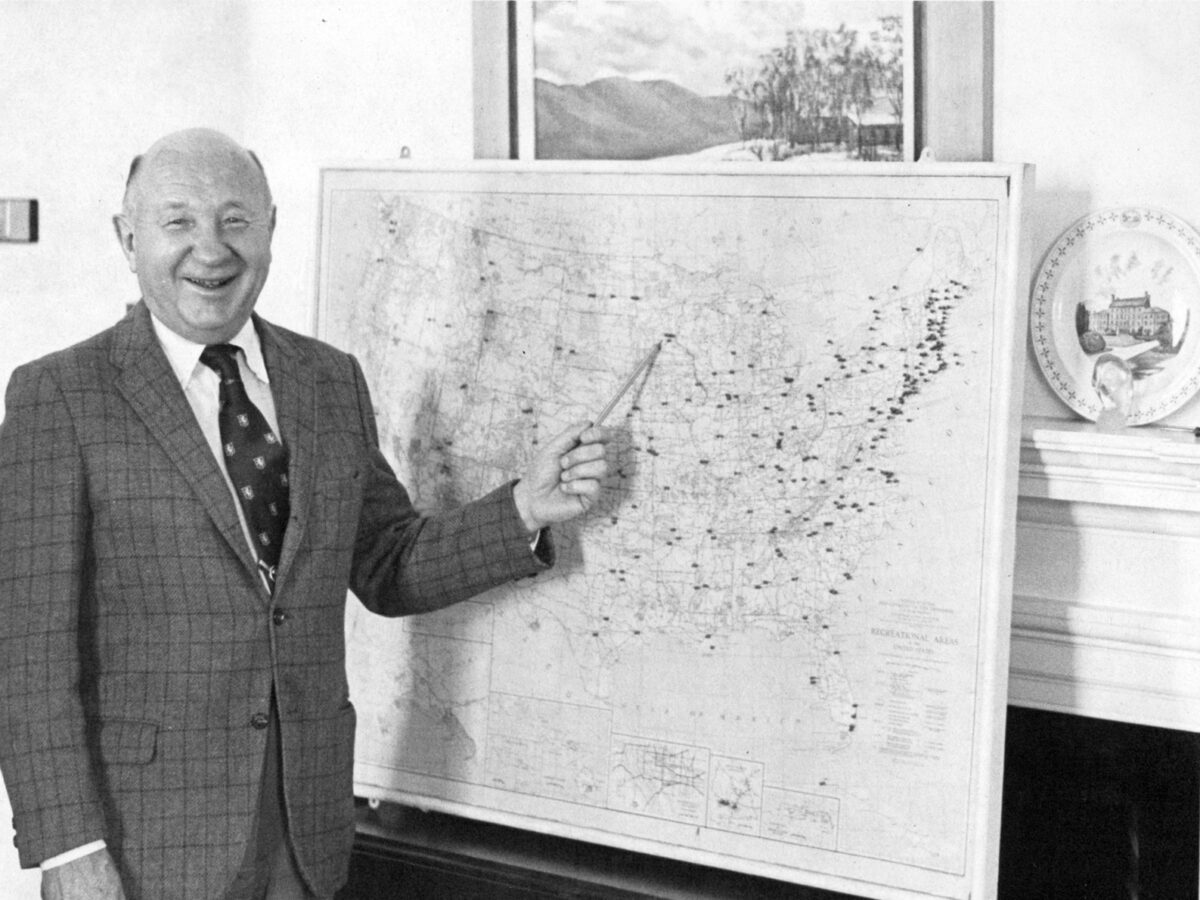
“How does Exeter benefit? It has an instruction system which calls for 12 students to be seated around a table with the instructor to talk things over. If all came from the same social and economic strata, their thinking would be almost identical.
“The scholarship plan gives an economic, geographic and social cross section of the nation and diversified thinking for full discussion of every phase of work in the school.”
—H. Hamilton Bissell to the Miami Daily News, February 15, 1949
Byron Rose ’59 tells the story of his teenage self, “painfully shy” and living in the can’t-get-there-from-here city of Evansville, Indiana, when H. Hamilton Bissell ’29 first came into his life. Rose had been accepted to Exeter on a generous scholarship but had declined the opportunity. That’s when Bissell turned up to talk some sense into him.
“To get to Evansville by train was not easy, but Hammy came and took me and my father out for breakfast,” notes Rose, who was impressed. “I said to my dad, ‘The worst that can happen is I go there for junior year and come back to Indiana afterward.’”
A version of that bacon-and-eggs sales pitch was delivered time and again across the Midwest from 1946 until 1960, with the man simply and affectionately known as “Hammy” making the case to more than 800 young men that Phillips Exeter Academy was the place for them. An English instructor for 13 years before being appointed by the school as its first director of scholarships, Bissell spearheaded an initiative to diversify the Academy’s student body through a comprehensive outreach project. The strategy would enable those boys whose families might not otherwise have the money — or, indeed, even an awareness of the school — to attend Exeter. That proactive effort has had everlasting effects, on the recipients who came to be known collectively as “Hammy’s boys” and on the Academy itself. More than 70 years on, Bissell’s legacy remains vibrant, still full of its original promise.
“I have heard it said that education is America’s magic,” Bissell told Boston Post Magazine in 1949, under the eye-catching headline, “He Scouts for Scholars.” “America is supposed to be a democratic institution. I am sure, however, that economic, religious and racial differences produce attendant inequalities of opportunity among boys and girls.”
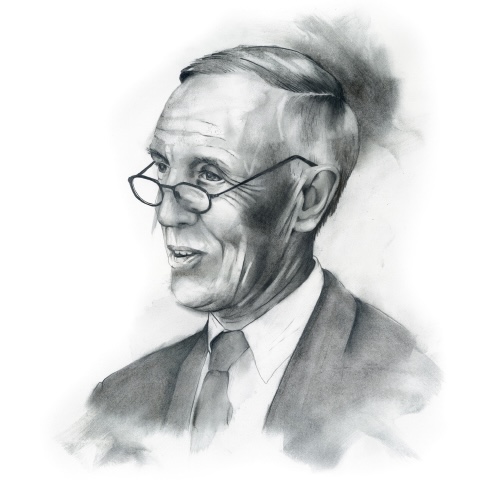
In seeking out potential students who were impacted by those limitations, Bissell worked with educational guidance personnel; 4-H, Scout, and Future Farmers leaders; those working with refugees and their families; YMCA officials; and, most famously, newspapermen employing delivery boys.
Rose was delivering newspapers in Evansville when Bissell found him. “It was purely serendipitous: Mr. Ellis, the man who owned the newspaper, had gone to Exeter,” Rose recalls. “I was a good athlete — I was playing basketball and was a runner — but I was also painfully shy, so I said, ‘No.’ Mr. Ellis said, ‘Well, let’s just send in your application. You might not be good enough.’ Which really spurred me on, actually.”
Rose was accepted on an eye-wateringly good scholarship: “Room, board and tuition was $1,600 for the year; we got financial aid for $1,400, so for $200 my parents wouldn’t have me eating at home,” he laughs. At the time, he says, Exeter’s only publication was a book the size of a novel, with dry descriptions of the school’s courses. But Rose found a magazine article on Exeter that touted a calculus option for uppers. That intrigued the keen math student, but he still wasn’t convinced, and turned down the scholarship. That’s when Bissell showed up for breakfast.
The real jewel in that scholarship crown, according to Rose, was that Bissell didn’t just recruit students, he nurtured them on campus as well: “For a kid like me, the school was not a very welcoming place; it was pretty much sink or swim. I was woefully unprepared for some of the classes I was in, and having Hammy around really helped. He was able to steer me to people I could talk to.”
Bissell’s encouragement made the difference for Rose. In turn, Rose, who worked at Morgan Stanley for the bulk of his career, has made a difference to Exeter, serving on its Board of Trustees for 10 years, including three years as chair. “I jumped at the opportunity,” he says, noting that Bissell went out of his way to offer congratulations for Rose’s appointment: “I assume I was the first scholarship boy to be the head of the board, and I know that also pleased him.”
Rose describes serving on Exeter’s Board of Trustees as one of the best professional experiences of his life. “That opportunity to participate wasn’t just a way to contribute, it also meant working with a group of people who sat around the table with a common interest in mind,” Rose explains, inevitably conjuring up Harkness classrooms. “It was a fantastic experience working with all these really incredible people. Being on the board when we gave a eulogy for Hammy when he died was a high point for me. He was a wonderful human being.”
It was another breakfast meeting that brought Julian Conway Wilson’62 to Exeter. Wilson’s mother, the daughter of Robert Harold Ogle, one of the founders of Alpha Phi Alpha, the first African-American fraternity, was determined to get her son out of segregated Richmond, Virginia. “She got Hammy to come to me,” Wilson says. “She was determined to get me the hell out of Dodge. Hammy used to tease me with that story every time he saw me on campus, that my mother got me into Exeter because she fixed him one of the most wonderful brunches he’d ever had.”
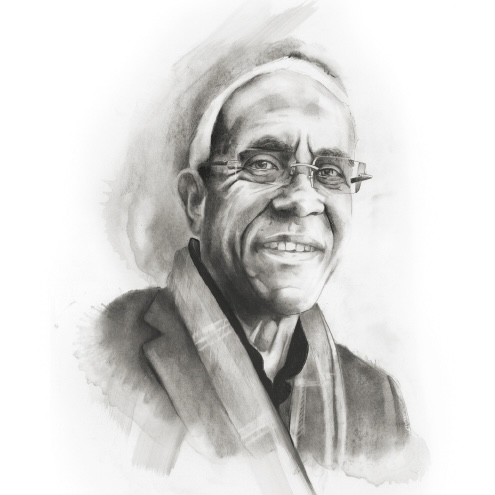
Wilson, like Rose, found Exeter extremely challenging; like Rose, he found sanctuary in Bissell’s humane approach. “Suddenly, I was around a lot of talented, well-prepared, motivated students from all walks of life. Hammy was visionary in his view of diversity for Exeter, and I think he made it a healthier culture. He tried to make sure that we, the scholarship boys, were as adjusted as we could be given Exeter’s culture at the time: He was a nurturing and protecting force at a time when Exeter was basically men against boys. I was pretty stubborn and hard-headed and independent, so I was called to the Dean’s Office at times. But Hammy moderated the trouble I got into, basically saying, ‘Look, he’s not a bad kid, he’s just his own kind of person.’ He gave me counseling, reminding me what a wonderful opportunity I had.”
Wilson incorporated that model of outreach and inclusivity when he attended the University of Pennsylvania, founding the school’s first group for students of color and fostering a welcoming environment, just as Bissell had done at Exeter. “I was always interested in human rights and social justice,” Wilson says. “It’s part of my DNA in every way. When I got to Penn, I had been well prepared at Exeter so I knew how to stand up to things — I knew I could meet another calling and help other students who might not be as well prepared. People who were at Penn with me were extraordinary, but they hadn’t had an Exeter education, so they were taken aback by the rigor and the social exclusion. Our group was there as support and also to work against attrition of students who were less prepared and resourced.”
Wilson, who currently works with the District of Columbia Housing Authority, has pursued that commitment to helping the disenfranchised and underserved throughout his career. “Everything I’ve done has focused on that,” he says. “I wasn’t a great student of Latin — in fact, I had to switch from Latin to German — but I know non sibi. I think we should help other people, love humanity and not feel that we are above others in any way.”
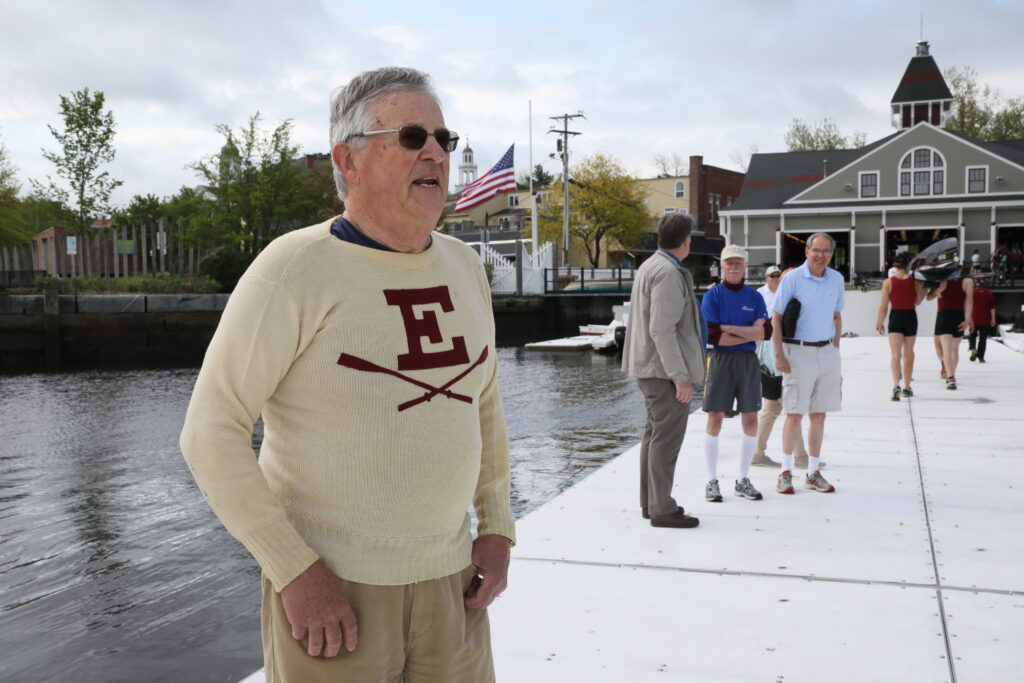
Jack Bissell ’58, pictured at the dedication of a crew shell named after his dad, says Hammy had great empathy for those whose backgrounds mirrored his own as a boy.
The empathy that Hammy demonstrated over the decades had very specific roots. “Dad was a scholarship boy,” says Hammy’s son, John “Jack” Bissell ’58; P’95, who pursued a career in law that included serving as a federal judge for more than 20 years. “He came to Exeter as a lower in 1926, and the school was very different then — there was no Harkness plan in the classroom yet — but he remembered the nurturing that the faculty gave him, the attention they paid to him. And, having come to Exeter from a poor background, he had a lot of empathy with kids who came from similar situations.”
His father, notes the younger Bissell, had his own generous and loving support system during his tenure as director of scholarships. “When Dad hit the road searching for qualified scholarship candidates, he was away nearly five months of every year until about 1960,” Bissell says. “Therefore, it was Mom’s strength and support which mostly carried me and my sister, Nancy, through those formative years. That unqualified devotion from this beautiful, gracious but tough New England woman was an example of loyalty which I have never forgotten: From both Mom and Dad, I saw that courage, character and caring are three very important tenets in leading a life that sets a positive example for both your children and others, and I never lost sight of that.”
That familial sense of inclusion was something that the elder Bissell disseminated with obvious pleasure. “Something in [Hammy’s] outreach rang a bell in my parents,” says Jim Peterson ’63, who lived in a remote spot of Iowa when Bissell came knocking. “I give them credit for having the insight and courage to encourage me to go to Exeter. In the tiny rural community where we lived, the notion of going away to a boarding school was just unthinkable.”
Peterson, a legal expert and published author who now divides his time between Chicago, says Hammy had great empathy for those whose backgrounds mirrored his own as a boy. And Peterson, remains active with Exeter. As a volunteer, he served as a major gift chair for his class as well as taking on the role of co-president leading up to their 50th reunion. He has also recognized his parents’ foresight in a tangible way. By establishing The Philip C. and Elizabeth Peterson Scholarship Fund, he ensured that future generations would be able to attend Exeter. It was a forward- focused gesture, stemming directly from Bissell’s original invitation. “Hammy seduced us all,” Peterson says. “My mother used to chuckle and — you know his physical appearance, a short, round-faced, jolly man? — she’d say that he came cruising through the Midwest like Santa Claus with that cherubic face and a bag full of money slung over his back, distributing opportunities for financial aid.”
Bissell had discretionary funds to spend on his scholarship boys once they were on campus, too, in case he determined that there was something a student might need that wasn’t within his budget. Peterson had worked his way up to be goaltender on the varsity hockey team, requiring specific skates: “It was not in my family budget to buy them, so [Hammy] went into his cookie jar and bought me a pair of skates. He enabled me to keep skating.”
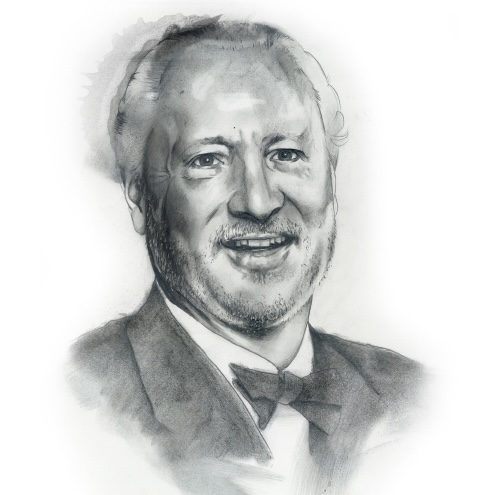
As a student employee, Peterson also appreciated Hammy’s work with Exeter’s Alumni Affairs Office, where Bissell held various roles starting in 1962, including alumni secretary and associate director of development, cultivating a sense of continuity with Exeter students long after they left campus. “What was really captivating about him in that role,” Peterson says, “was his recollection and memory and sensitivity to the students, especially with those for whom he’d provided the door-opening. You’d go back to campus and there he would be with a big grin, and he’d greet you and ask about your parents and remember them by name; he remembered your hometown and your class, and he knew who your friends were. He was such an avatar for the community nature of the school — the best part of the school, in other words.”
With Carly Kirsch ’20, a Peterson Scholarship recipient, that element of engagement brought Bissell’s overarching legacy nicely home to Exeter’s campus. An avid shot, discus and javelin thrower for the track and field team, Kirsch also has an abiding interest in the sciences and Russian, and a deep appreciation for the opportunities that the Academy offers. “Exeter has forced me to try new things,” she says. “Without going to Exeter, I would not have gotten into track, which is something I now plan on doing in college. Without Exeter, I would have never taken Russian or traveled to Russia for a month last summer. My Russian class has had the same eight people all three years, and we have a really strong bond.”
In a letter Kirsch wrote to Peterson this spring, she said, “From the bottom of my heart, I want to thank you for investing in my education. It is unbelievable the amount of opportunities I have as a 17-year-old girl from a small town in New Hampshire. Every day I get to walk into the largest secondary school library in the world. Twice a week I get to listen to inspiring assembly speakers. And every day I get to be surrounded by some of the most incredible humans whom I can call my friends. I am so lucky to attend Phillips Exeter Academy and I know it wouldn’t be possible without you.”
The ripple effect that one man’s actions can have decades later shines in stories such as Kirsch’s, and hers is one among many. Kathy Nekton, who led Exeter’s physical education department alongside her husband, Roger, for 35 years, remembers Bissell vividly. As the girls field hockey coach, Nekton had his granddaughter, Katie Bissell ’95, on one of her teams. “Hammy was absolutely faithful in coming out to practices on his bicycle every day,” Nekton says. “And when we were going to away games, he would always come bearing chocolate bars and see us off.”
Even after his granddaughter graduated, Bissell continued to attend field hockey team practices. For those young athletes, Nekton observes, having someone with such a deep and enduring connection to Exeter supporting them with such regularity had an indelible impact. “To have an older adult be so faithful was just wonderful for the girls,” she says. “It’s like having your grandpa come out and cheer you on.”
Exeter, Nekton adds, has terrific resources that allow its faculty to support and care for their students, but Bissell was actually ahead of that particular curve: He led by example, and his pioneering vision is integral to what drives the school today in terms of inclusion and diversity.
“He was innovative,” Nekton notes. “He was such a compassionate man and he looked for ways to make that possible for others, too. He set the context for that kind of approach, making sure that all the kids — and a wider variety of kids — had access to our community.”
Wilson agrees that Bissell’s impact cannot be overstated. “He was really focused on young people in an extraordinary way, and that made all the difference. At Exeter, I learned that smart people come in all sizes, shapes, colors and genders; Exeter was a place where stereotypes were challenged. Hammy worked very hard to make Exeter an increasingly place, in a very positive way.”
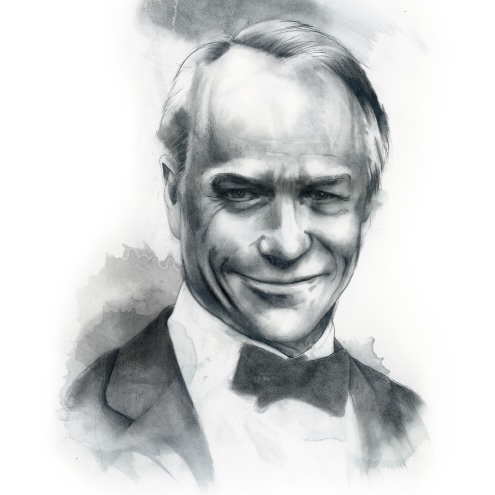
A self-described “kid from the Midwest who got magically transported to four of the most transformative years of my life” at Exeter, David Beim spent a lifetime dedicated to service, community and forging for others the sorts of opportunities he was so grateful to experience. He died peacefully at his home in Riverdale, New York, on June 6, 2019. He was 79 years old.
Beim was a newspaper delivery boy in Minneapolis when Director of Scholarships H. Hamilton Bissell ’29 found him through the paper’s circulation director in 1954. Like so many of the students Bissell identified in that era, Beim seized his opportunity to attend Exeter and thrived in its midst, and success followed him after graduation. He shined at Stanford and was a Rhodes Scholar at Oxford. He spent 25 years in investment banking on Wall Street, and the next 25 years in academia as professor of finance and economics at Columbia Business School.
Beim remained beholden to Exeter and the doors it opened, and when he became a trustee in 2002, he was a champion for opening doors to others. His work as a trustee centered on affordability and expanding the school’s commitment to financial aid. He authored a report the Trustees used as a guidepost in increasing aid by 18 percent to lower-income students in 2006.
“Our mandate from John Phillips was clear: to serve youth from every quarter, not just those who can afford the price,” Beim wrote in The Exeter Bulletin in 2012. Beim is survived by his wife, Elizabeth, a son and a daughter, and five grandchildren. An appreciation of his contributions published in The Riverdale Press included a line that aptly summarized his life’s perspective: “David Beim put family first, education second, and serving the community a very close third. Everything else was, well, everything else.”
— By Patrick Garrity
This article was originally published in the summer 2019 edition of The Exeter Bulletin
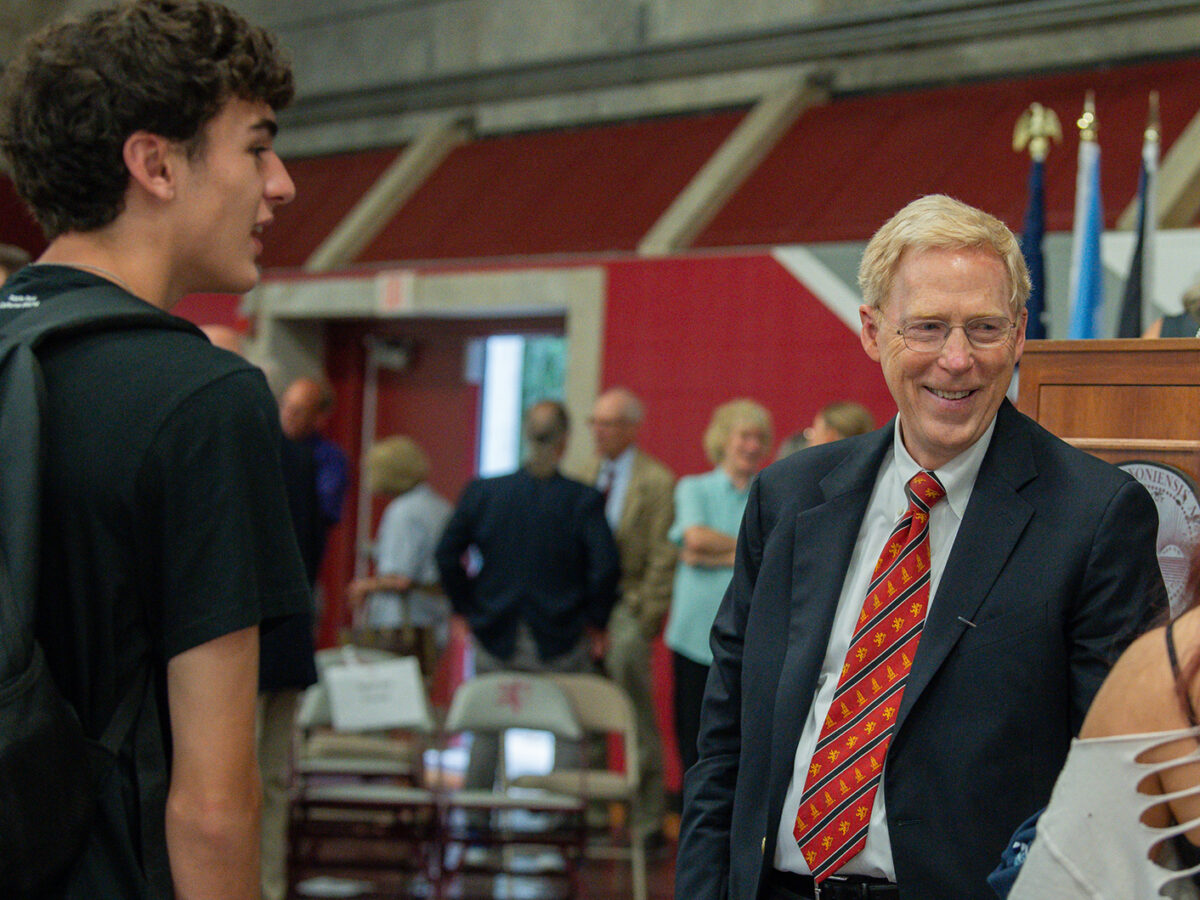
Good morning, Exeter.
Thank you, Assistant Principal Page, for welcoming our emeriti faculty and their families to Opening Assembly this morning. It is a wonderful tradition to welcome and honor our emeriti faculty at Opening Assembly each year.
Thank you, Dean Foley, for introducing and welcoming our new faculty. Our new faculty bring a wonderful diversity of talents, interests and experiences to our school. We are delighted that they have chosen to teach and work at Phillips Exeter Academy.
I would like to extend a special, warm welcome to all our new students. You are 336 in number and come from 36 states and 26 countries. You too bring a wonderful diversity of talents, interests and experiences to our school. We are excited that you are finally here, ready to begin your Exeter journeys.
Returning students, welcome back. I hope you had restful summers. It has been a great joy these past few days to see you back on campus, ready for another year.
Seniors, it is very special to see you in the front section. You are going to lead the way this year. I believe we are going to have a great year. Your leadership will be one of the reasons why.
Many of you know that I attended Exeter as a student. I have strong memories of attending Opening Assembly as a new Lower many years ago. I was excited, and happy to be here, but I also felt unsure. Everyone around me seemed more confident than I felt. Everyone around me seemed more at ease than I was. I couldn’t help but wonder: Would I measure up? Would I fit in? Did I really belong here?
With those memories still in mind, I will tell you now the three things that I most would have appreciated hearing as a new Lower many years ago. These are the same three things that I say to new and returning students at Opening Assembly every year. Rest assured:
At Opening Assembly every year, I also unveil a new school t-shirt for the year. I do this because it is fun, but also because it is one way to convey that you are all Exonians now. The shirts all have the same image on the back. Here is this year’s shirt. This is an image of our newly renovated Davis Building — I will explain more about Davis Building in a minute. Near the top of the building, the shirt reads, “you will always belong here.” On the front, you will see a class year. Be sure to get a shirt with your class year on it. You can collect your shirts after this assembly in front of the Goel Center.
Each year at Exeter is a little different. One difference this year is that the Academy Building is undergoing a complete renovation. That is why we are in the gym this morning, and this is where we will hold most of our assemblies this year. Many classes that ordinarily would be held in the Academy Building will be held in other buildings, in some cases in meeting rooms that have not been used as classrooms before. We have adjusted our daily schedule to provide more passing time so you will be able to get from the science building to the fourth floor of the library in time. A project of this magnitude is certain to cause some unexpected challenges. We ask for your patience. Your patience will be rewarded with a beautifully restored Academy Building, a new Assembly Hall that will seat more than 1300, a new design lab — and air conditioning!
The Classical Languages Department has moved to the newly renovated Davis Building, adjacent to the library and Elm Street dining hall. This beautiful building, built in 1911, was the library when I was a student. You don’t have to study Latin or Greek to go into this building. Please check out Davis at your first opportunity. In addition to four spacious classrooms on the ground floor, at the top of the marble staircase you will find a wonderful new reading room and lovely smaller meeting room.
At Opening Assembly each year, by tradition, we take a few moments to reflect on our Deed of Gift and our mission as a school.
Our mission has not changed since our school was founded in 1781. Our mission is to unite goodness and knowledge and inspire youth from every quarter to lead purposeful lives.
We adopted this modern expression of our mission only five years ago, but each key word can be traced to our Deed of Gift, written by John and Elizabeth Phillips 244 years ago. Our mission statement expresses our belief that your time here matters; that what you do here, and how you learn and grow, are important because, like past generations of Exonians, you are here to prepare yourselves to lead purposeful lives.
Our mission statement is accompanied by five core values that also can be traced to our Deed of Gift and that have remained constant throughout the rich history of our school.
Our Deed of Gift states:
“Above all, it is expected that the attention of instructors to the disposition of the minds and morals of the youth under their charge will exceed every other care; well considering that though goodness without knowledge is weak and feeble, yet knowledge without goodness is dangerous, and that both united form the noblest character, and lay the surest foundation of usefulness to mankind.”
Knowledge and goodness. Goodness and knowledge. We say it both ways because they are equally important. As you grow in knowledge at Exeter, you also will have opportunities to explore the meaning of goodness, be challenged in your thinking, learn with and from each other, and grow in your own understanding.
We aim high at Exeter. That is why you are here. But we don’t focus on a narrow definition of success. We focus on learning and growth. Through Harkness, we seek to instill in each of you such qualities as intellectual curiosity, creativity, empathy and respect. We seek to inspire you to develop critical thinking skills and seek complex truths. We will not tell you what to think; our goal is to teach you how to think. I hope you will find joy in this way of learning, even though it is challenging and at times hard. In meeting the challenges that you will face, you will grow in confidence and realize your own ability and capacity to learn.
Our Deed of Gift states that the Academy“shall ever be equally open to youth of requisite qualifications from every quarter.” Our need-blind admissions policy allows us to admit students without regard for any family’s ability to pay tuition or other costs of an Exeter education. Our diversity, across every dimension of identity, is a defining strength of our school that propels our learning and growth as individuals and as a community.
These words are inscribed on our school seal and attest to our philosophy that wisdom gained here should be used for the benefit of others and not only for oneself. We boldly state that we seek to graduate young people whose ambitions and actions are inspired by their interest in others and the world around them. Non sibi is the very ethos of our school. It starts right here with how we treat each other, how we contribute to the life of our school, and how we express gratitude for the privileges that we all enjoy by being a part of this community.
In the very first sentence of the Deed of Gift, John and Elizabeth Phillips wrote, “the time of youth is the important period, on the improvement or neglect of which depend the most weighty consequences, to individuals themselves and the community.” With these words, John and Elizabeth Phillips explained why they dedicated their wealth to the creation of this school. They believed that a school committed to knowledge and goodness, open to youth from every quarter, and grounded in a culture of non sibi, could transform individual student lives and make a difference in their communities – in short, that such an Exeter could inspire and prepare all of you to lead purposeful lives.
With our mission and our five core values firmly in mind, we strive every year to be the best Exeter we can be. Our aim is to support your learning and growth and change your lives, as Exeter has changed the lives of prior generations of students since the founding of our school.
Your goals as students should be to value your time here, make the most of the opportunities presented to you, and have fun.
I want you to aim high, have fun, and find joy in everything you do: your classes, dorm life and activities, clubs, teams, ensembles, performances, competitions – everything you do. I hope you have fun trying new things, making new friends, taking on leadership roles, and finding ways to help others. I hope you embrace what you find hard, expand your reach, and find joy in your personal growth and development.
As you contemplate the year ahead, I would like to encourage you to focus this year on empathy.
Empathy is the capacity to understand and appreciate another person’s feelings and experiences. Empathy is important because it opens our hearts and minds to the kind of learning and growth that we seek to encourage at Exeter. It helps us to be curious about how and why others might see the world differently. Empathy enables us to see ourselves and others as learners. It helps us learn to be comfortable having our thoughts and ideas tested by others whose ideas, perspectives, experiences or identities are different from our own.
Empathy is fundamental to our Harkness pedagogy. It leads to deeper learning, greater personal growth, more effective leadership, and more meaningful contributions to the lives of others.
I hope this year you will lead with empathy in all you do.
As most of you know, this will be my last year as principal. Like our seniors, I will be doing a lot of things for the last time, including this Opening Assembly. I am sure there will be some wistful moments, but I am very excited about this year and anxious to get started.
In my first Opening Assembly seven years ago, I said, “We are not special merely because we are here, but because we are here, we have the opportunity to do special things together.” In making this statement, I was emphasizing qualities of humility, gratitude and self-belief – qualities that I believe can empower all of you to thrive during your time here. I can’t wait to see what special things all of you will do this year. I intend to be there every step of the way, cheering you on, and applauding alongside your teachers, advisors, coaches and other mentors.
Let’s make this a memorable year. Let’s be the best Exeter we can be. Let’s commit ourselves to the mission and values of our school and approach each day with gratitude in the spirit of non sibi. Let’s aim high, have fun, and find joy in all we do.
By tradition, we dismiss the senior class first at Opening Assembly. Preps, Lowers and Uppers, please stay seated while seniors exit.
Thank you.
Senior Class.
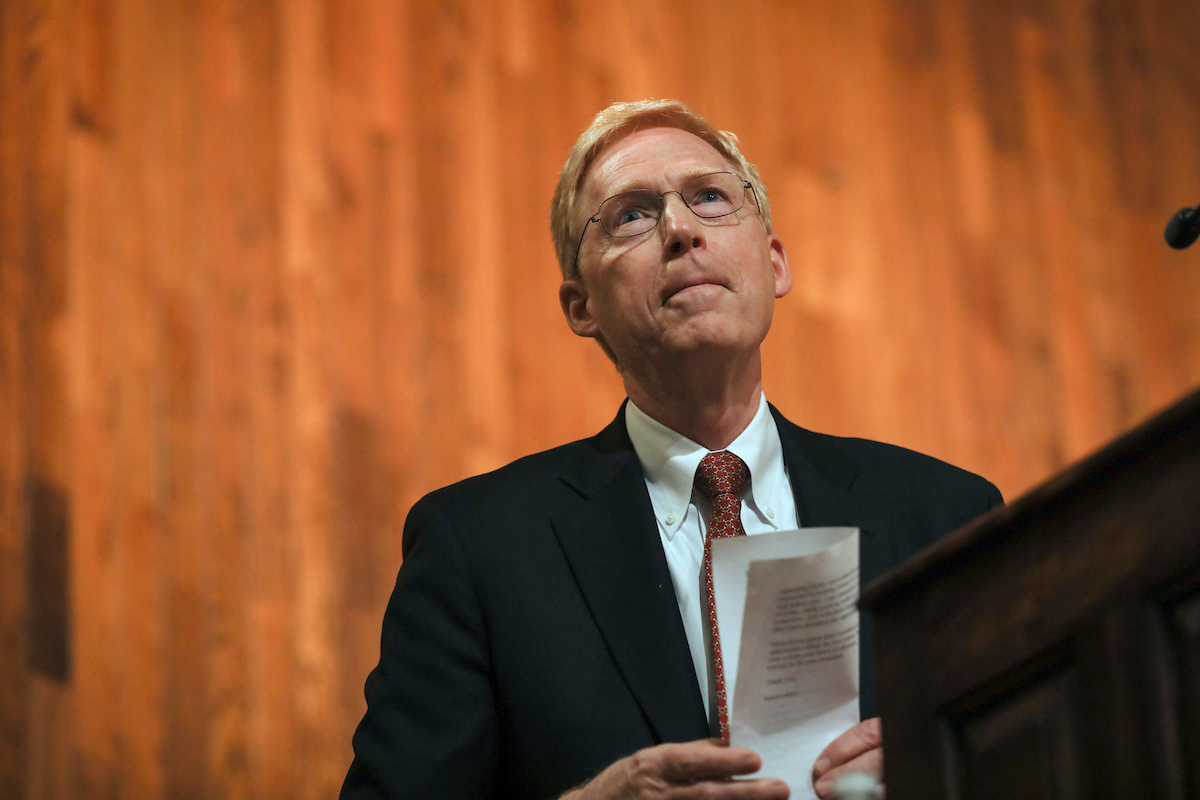
The legendary Hammy Bissell ’29; P’58 said to me many years ago, “Exeter isn’t what it used to be, and thank God it never was.” Hammy was quoting an alum who had said the same to him many years before. Apparently, we have been reminding ourselves for quite some time that Exeter’s future does not lie in the past, that Exeter has never stayed strong by staying the same.
Lewis Perry, toward the end of his astonishing 32-year tenure as principal, stated, “There is no fundamental incongruity between tradition and development.”
Principal William Saltonstall ’24; P’55, P’59 used a rowing metaphor to describe Dr. Perry’s administration as a “bright beacon,” astern by which the school might keep a “steady course” while “we bend our oars toward the future.” In a speech given at Andover, he stated, “Faculty and students at Andover and Exeter must, it seems to me, be constantly re-examining what we are about.”
This effort to re-examine constantly “what we are about” will continue in the coming academic year. Through the New England Association of Schools and Colleges reaccreditation process and our own strategic planning, we will examine critical issues such as our pursuit of academic excellence; the quality of experiences we provide to students outside the classroom; our financial aid practices and policies; our commitment to building and supporting a diverse, equitable and inclusive community; our progress addressing student wellness and support; and our responsibilities as strong environmental stewards.
These are weighty subjects, and every member of the community has a role to play. The focus will be on the school as a whole and directed always toward the best interests of our students. We will ask hard questions and embrace the challenge inherent in our aspiration to live up to the Deed of Gift. We will value our historic strengths and explore new ideas and new approaches that build on those strengths. In the spirit of a Harkness discussion, we will come to the table keenly interested in hearing what others have to say. Through discussion and collaboration, we will produce collectively the best thinking of our community.
That is where the readers of this column will come in. As our thinking coalesces around specific proposals that we believe will advance the mission of the school, we will share our thinking with you, and ask for your best thoughts in return. And as the need arises, we will ask for your support.
The Deed of Gift states at the end of the first paragraph, “[T]he time of youth is the important period, on the improvement or neglect of which depend the most weighty consequences, to individuals themselves and the community.” At Exeter, we act on that belief every day.
I would like to conclude by expressing on behalf of my family our deep gratitude for the support we have received from the Exeter community since the death of my beloved wife, Mary Rawson, on June 14, 2018. Mary knew Exeter well and believed in the mission of the school. My family and I have been moved by the notes and letters that have recognized Mary’s remarkable qualities and the role she played in the lives of so many.
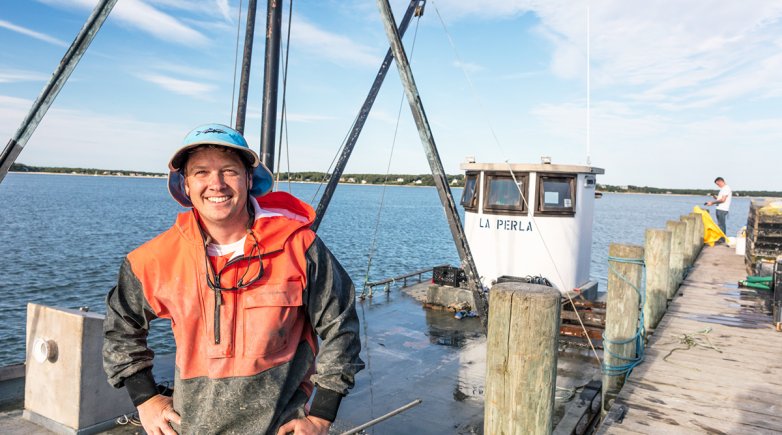
While you won’t find a specific class on entrepreneurship in the Academy’s Courses of Instruction, Exeter instills in its students that often elusive mix of traits found in all innovators: compassion, intellectual curiosity and good old-fashioned grit.
We caught up with two alums who have taken their lessons to heart. Peter Stein ’00 followed his passions out to sea, trading his office cubicle for an oyster barge, and Jim Tselikis ’03 translated a love of lobster rolls into a multimillion-dollar food truck business. These Exonians walked the proverbial plank, jumped into nontraditional business ventures wearing little more than floaties and made quite a splash.
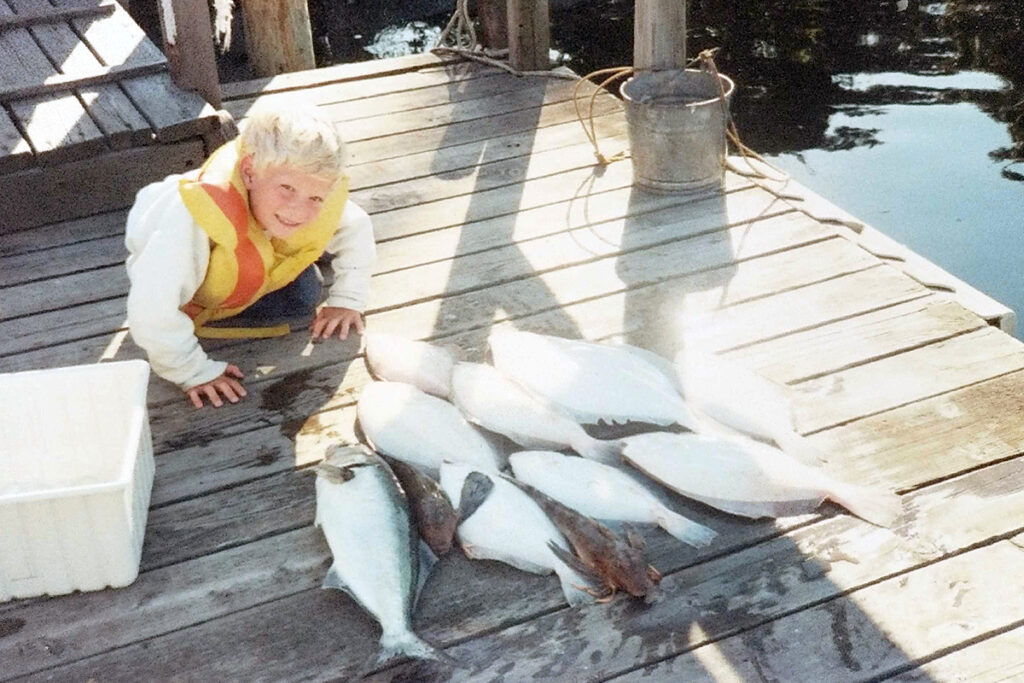
Stein as a young boy proudly showing off fish he helped catch.
Most days, when the sun rises over New York’s Little Peconic Bay, Peter Stein is at the dock to greet it. From the deck of his 37-foot barge, La Perla, he can look out over the bay’s tidal estuary, fed by inflows from the Atlantic Ocean, and see the links of Shinnecock Hills or the sandy shores of Shelter Island. Stein’s family settled just 20 miles from this spot some 45 years ago. He grew up and learned to fish in these waters. And it’s now where Stein is dropping his lifelines. With no formal training in aquaculture, he purchased acres of muddy bay bottom and opened an oyster farm, naming it Peeko Oysters.
Sounds romantic. But that’s a meme the 37-year-old is quick to dispel. “Most people picture the beautiful bay, the calm water, and think the job is like a Billy Joel song,” he says. “And it’s just not like that.” Stein found out the hard way just how tough farming can be. During his first season in 2016, a nor’easter blew through and Stein’s only boat sank.“ I didn’t prepare correctly,” he says, “which was a little embarrassing.”
Later that year, Stein put hundreds of thousands of baby oysters into the water, secured his gear for the winter and walked away. When he returned in early spring, 90 percent of his oysters and gear were gone. He had used the wrong gear, weighed it down wrong, secured it on the wrong type of line, in the wrong depth of water … and the list goes on. “Mother Nature is going to let you know you screwed up. … She is a relentless and wonderful teacher,” Stein says. After such a devastating setback, many would have given up. Stein rolled with it: “You have to battle back from it and find silver linings and persevere.”

Peter Stein aboard his oyster barge, La Perla.
In many ways, oyster farming was an unlikely career choice for Stein. “It’s funny,” he says, “my background is not farming, it’s business development and sales.” After graduating from the University of Pennsylvania with an English degree, Stein spent three years at Accenture doing management consulting. From there, he moved to academics and landed a position teaching sixth grade. After that, he hooked up with the sales divisions of a few startups in the education software technology space. From job to job, nothing really clicked, and eventually fate took over.
When Stein returned from his honeymoon in 2015, his boss greeted him with some bad news — he was laid off. “I was a bit bitter about that,” he says. “But it gave me headspace to just think.” Stein became fascinated with the local-food movement and especially the idea of producing food without chemicals. “I learned about all these cool new things happening in the world of aquaculture and aquaponics and aeroponics,” he says. “And then I started to contact some of the people in my home community to find out if anyone was doing any farming like this, and if so, how I could get involved.”
Stein walked the wharves of eastern Long Island chatting up as many people as he could who were farming in the local waters. “The Harkness table does not necessarily an oyster farmer make,” he says. “But it did teach me to be unabashed about asking elementary questions of any- one who could provide me with sound and wise advice and empirical knowledge that I just simply didn’t have.”
He also reached out to Exeter friends like Sam Bradford ’98, who runs Mac’s Seafood on Cape Cod. Stein shadowed Bradford for the better part of a day to soak up all he could about how to run a successful seafood company. That visit was a turning point. “Sam really gave me the validation and reassurance that what I was venturing into could have some success,” Stein says. “I remember him saying, ‘It won’t be easy, but just go do it.’”
When he met a bayman looking to retire and sell his oyster business, Stein took the bait: “Without hesitation or really any sort of cognizance of what was happening, I said, ‘Yeah, I’m in.’” Now instead of working with people with MBAs and Ph.D.s, he’s hanging with folks who earned their degrees on the water, by his own accounts a “salty” crew.
In 2017, Stein brought just 25,000 oysters to market. This year, he is expecting to bring 250,000. That jump is partially due to the life cycle of an oyster. They take a while to grow. An oyster that is served at a restaurant, for example, is typically 2 to 3 years old. The oysters Stein is putting in the water this year won’t be ready to harvest until 2020.
Stein and his two-man team cultivate, harvest and then deliver oysters to some of the toniest restaurants in New York City, where celebrity chefs such as Tom Colicchio dish them up to well-heeled patrons. Stein also works the private party circuit, bringing his delicacies on the road for special occasions and running oyster-tasting cruises out on the bay. Most recently, he shucked for golfers like Jack Nicklaus at the U.S. Open’s player hospitality tent. But he doesn’t farm oysters just to hobnob with the rich and famous. He’s serious about making a positive impact on the planet. “Even if you despise shellfish as a consumer,” he says, “you should be a big fan of it from a preserve-the-earth perspective.”
A single adult oyster can purify up to 50 gallons of water each day. As the water passes through the bivalve, harmful pollutants are filtered out. Oysters are like vacuum cleaners, mitigating against environmental hazards, Stein says. Aquaculture is also extremely efficient: Farmers produce lots of protein in a small amount of space — all while providing a net benefit to the environment.
“In a small corner of my mind,” Stein says, “I think that the more oysters I grow, the more benefit I am having on our environment and, in particular, the specific estuary in which my farm exists and that I love, and that I grew up in.”
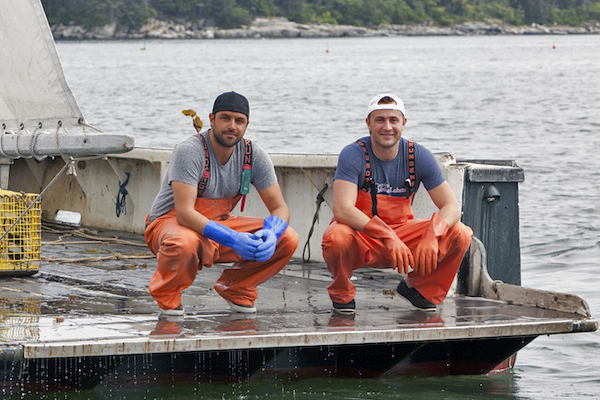
Cousins and business partners Sabin Lomac and Jim Tselikis ’03.
Careers often follow a standard, linear path. An entry-level position leads to a promotion, and so on, in a predictable, forward progression up the corporate ladder. That wasn’t the case for Jim Tselikis. His path was more like a right angle.
The abrupt turn in Tselikis’ professional life occurred in April 2012. He was driving south down the 405 along California’s coast with his cousin Sabin Lomac riding shotgun. They were heading to a nondescript parking lot in Los Angeles — the predetermined site for the grand opening of their fledgling food-truck operation, Cousins Maine Lobster. The idea was to sell the kind of Down East Maine lobster rolls they grew up with to the uninitiated Hollywood set. It was a business plan dreamed up while playing rounds of NHL ’94 on Super Nintendo. “I didn’t expect much of it,” Tselikis remembers. “It was really nothing more than a passion project at the time.” Their entire prelaunch marketing campaign consisted of a single grainy photo posted to Twitter.
Things got real soon after they rolled up to the location. “Before we even opened our windows there were 75 people in line,” Tselikis says. “We had nine people in our food truck, but no one had training, nobody had ever buttered a bun,” he says. “We didn’t even have a cash register. We forgot it.” The motley crew held it together for five hours and the lobster rolls garnered rave reviews. “We closed the window that night and said, for lack of a better phrase, ‘Holy shit, this could be something big.’”
They were right. Within days of opening, the cousins were offered a spot on ABC’s “Shark Tank,” a reality television show where budding entrepreneurs pitch their ideas to established business titans in the hopes of walking away with valuable partners and seed cash. While the opportunity was tempting, the cousins demurred. They wanted to establish their model before trying to sell it on national TV. By October, the cousins had made their 52-minute televised plea and landed a $55,000 investment, plus a partnership deal with real estate mogul Barbara Corcoran. Almost overnight Tselikis was booking spots on mainstream media outlets such as “Good Morning America,” the “Today” show and “Master Chef.” With national exposure, an expanded budget and a new influential partner, Cousins Maine Lobster prospered. Tselikis officially quit his day job of four years as a medical device sales associate at Stryker Orthopaedics, and his career’s right turn was complete.

A Cousins Maine Lobster food truck parked on the San Diego waterfront.
The company is now valued at $20 million and counts 32 food trucks in 16 cities throughout the country. The owners franchise their business model and have opened six brick- and-mortar restaurants domestically and one in Taiwan.
Through all the changes, the 34-year-old Tselikis has remained grounded by his connection to people. “I always go back to Maine, the industry, our lobstermen, ”he says. “They are the reason we have product. Not a lot of people realize how hard their job is.” The amount of lobster that lands along the coast of Maine each year can vary from 60 million pounds to 130 million pounds, and who gets access to those lobsters is a matter of trust. “It’s not just the one who comes and waves the million-dollar check that people do business with,” Tselikis says. “It’s a relationship built on loyalty, on who you are, who your kids were growing up.”
Tselikis grew up in the heart of lobster country, in the coastal town of Cape Elizabeth, Maine. He spent summers working on boats and going to lobster bakes on the beach with family and friends. “It is a different way of life,” Tselikis says. “Down East Maine is very laid back. You take care of people. … There’s an informal love and appreciation for each other.”
Tselikis describes himself as a “fish out of water” when he started as an upper at Exeter. “My town had no diversity and maybe 5,000 people,” he says. “I remember my first math class at Exeter. I was one of three out of 11 kids who were from the United States and I was like, ‘Oh my God, this is cool and different.’”
He spent his first few months focused on academics and the hockey team. When his parents got his first Grill bill for just $1.75, they urged him to “get out more.”
Tselikis signed up for ceramics, joined clubs and began embracing the school’s Harkness philosophy. “At Exeter, I asked a million questions and I never felt bad about doing so because I didn’t want to miss the boat,” he says. He also built lasting relationships with faculty members and especially boys varsity hockey coach Dana Barbin, with whom he still stays in contact. During his two seasons on the ice for Big Red, Tselikis netted 25 goals and 67 assists. Lessons learned at the rink still apply. To this day, Tselikis uses Coach Barbin’s signature quote with his employees: “If you’re prepared, you have nothing to worry about.”
Editor’s note: This article first appeared in the summer 2018 issue of The Exeter Bulletin.

1. Tejo
We were finally old enough
my brother and I
to join our cousins
in the game of tejo
They drank beer
ate empanadas and chicharrón under
the glow of a disco-ball light
Neon pink and red bulbs flickered
The walls of la tiendita were sticky with
the remnants of clay
and burnt plastic
We split into teams and then
we threw the metal disc at the
gunpowder chips
The sizzle and smoke
the strike and pop!
muted by the “oye!” and “epa!”
of winning
One point for each mecha
two if you hit the chip in the middle
none if you miss the clay board
We played three games to 25,
then ran out of pocket money
The sun was still the king of the sky when
we stepped outside
and took a breath
High-school boys honked and whistled
at girls crossing the street
reggaeton blaring from their Toyota
Shirtless workers sat on the sidewalk
licking their fingers
as they shared rellenas and salchipapas
It was Sunday
and the night was alive
with vallenato and samba
and alegría
2. Sapo
Outside la tiendita
street lights flickered on
one by one
We returned after dinner
to launch metal rings at a tower
with holes on the top and on the front
Wood colored blue red yellow
Standing as a semi circle
a crescent moon
we took turns throwing the rings
straining to get them into a slot
We hit the crate of Coke bottles beside
the wall
one too many
times.
The store owner laughed at us from the
other side of the
glass window
Teens in hoods
and girls in heels
picked up the rings that rolled away
skittered in between wheels of bicycles
and fell flat beside a gum wrapper.
My phone rang
“vuelvan que ya oscureció”
Above la tiendita
the stars twinkled
And we were kids again.
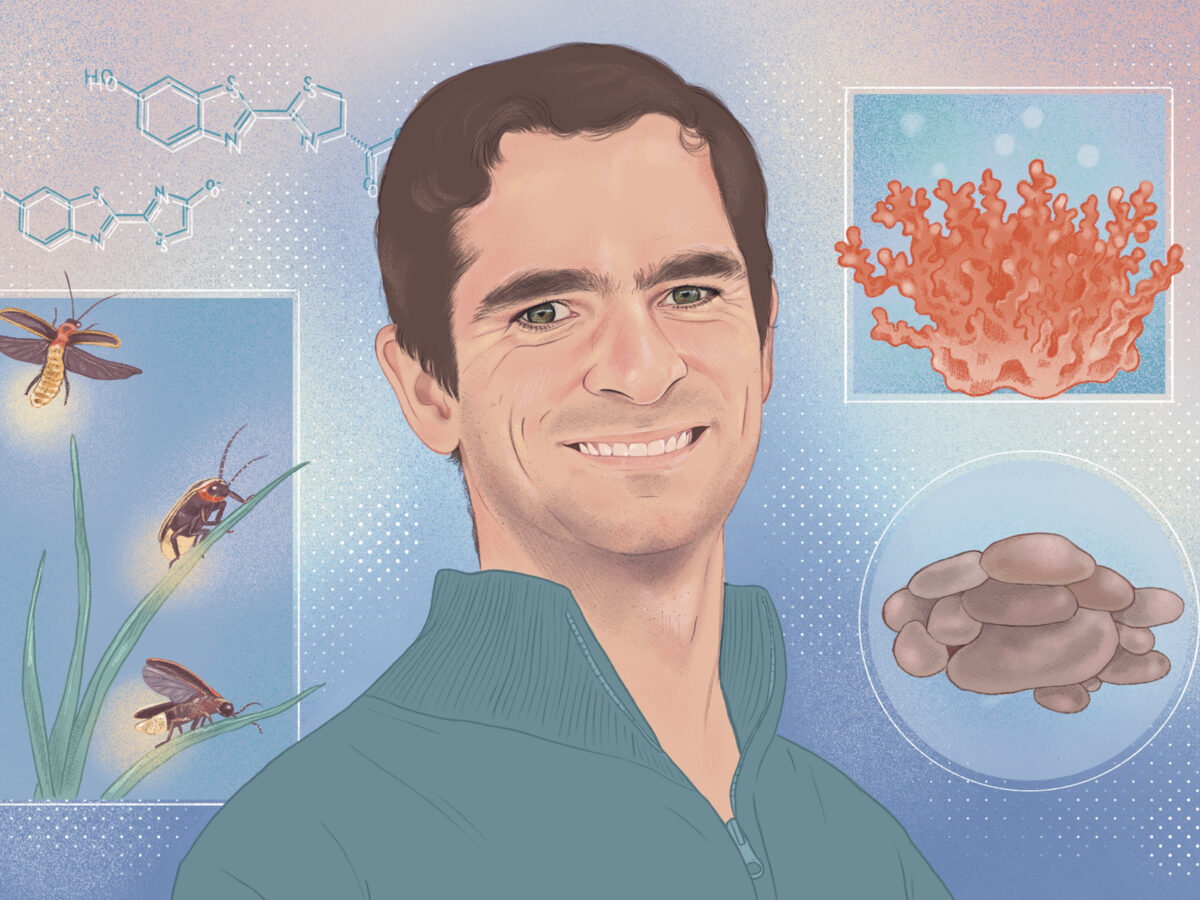
“Our daughter ate a rock,” I told my spouse as he returned from crew practice one afternoon. “I tried to stop her, but she’d swallowed it by the time I got there.”
Curiosity is a strong, and sometimes uncontrollable, impulse. My daughter’s urge to taste a rock (honestly, it was a small pebble) is not much different from what piqued my interest in organic chemistry: the desire to know more about the world. Like my daughter — whose favorite phrase is “What’s this?” — I’m constantly asking questions. Mine are slightly different, and chemistry has been the lens that I’ve used to find answers. Why do fireflies flash at night? A reaction between luciferin and the enzyme luciferase. Researchers call this type of curiosity “joyous exploration” and have investigated its role in learning and motivation.
The most frequent response I get when I share that I’m a chemistry teacher is, “I hated that subject.” I never quite know what to say other than to list the course I dreaded most (history). But I often wonder, what is it about chemistry that elicits such a strong reaction, and is there any way to get students more excited to learn it?
Each spring, Exeter’s Center for Teaching and Learning asks for project proposals from faculty looking to research a topic during the following school year. Usually, I am a bit of a dabbler, a stone skipping across the water’s surface. A yearlong project seemed like a great way to focus on a single topic, to dig into the research on curiosity, assessment and student engagement, and hopefully to find a way to combat chemistry’s PR problem.
During the fall term, I wanted to learn how students felt while completing chemistry homework, studying for exams and working at the lab bench. It came as somewhat of a surprise, but most students said they enjoyed learning the topic and some even found the subject interesting. They just weren’t too keen on studying for the tests. They reported feeling nervous, anxious and “cooked,” and constantly worried whether they had studied enough. And most students wanted more practice — practice tests and problems to help build their confidence. Maybe chemistry wasn’t the problem, and it was the tests that left a bad taste. Perhaps a different type of assessment could improve student engagement.
Instead of tests and lab reports, I asked students to explore a topic of their choice and explain it the way a chemist would. For another assignment, students created a small art exhibition inspired by the concept of entropy. I hoped that they would enjoy these projects, worry less and feel more confident in themselves.
The students amazed me with their wide range of topics — such as coral, diet soda and ceviche — and their projects. One senior made a video of her interpretive dance of statistical thermodynamics. Another mixed and layered two songs to create an acoustic interpretation of entropy and disorder. A third showed a video of lightning bugs blinking synchronously in an Appalachian forest and explained to the class how chemiluminescence can produce something so cool.
Before my partner returned from the boathouse, I Googled “what to do if your child swallows a rock.” I wasn’t too worried, only wanting to fill in a gap in my knowledge. This is called epistemic curiosity. Directionless curiosity, like shoving a handful of pebbles in your mouth, is known as diversive curiosity. Turns out, when you blend diversive and epistemic curiosity, work can seem like play.
Illustration by Becki Gill
This article was originally published in the summer 2025 edition of The Exeter Bulletin.
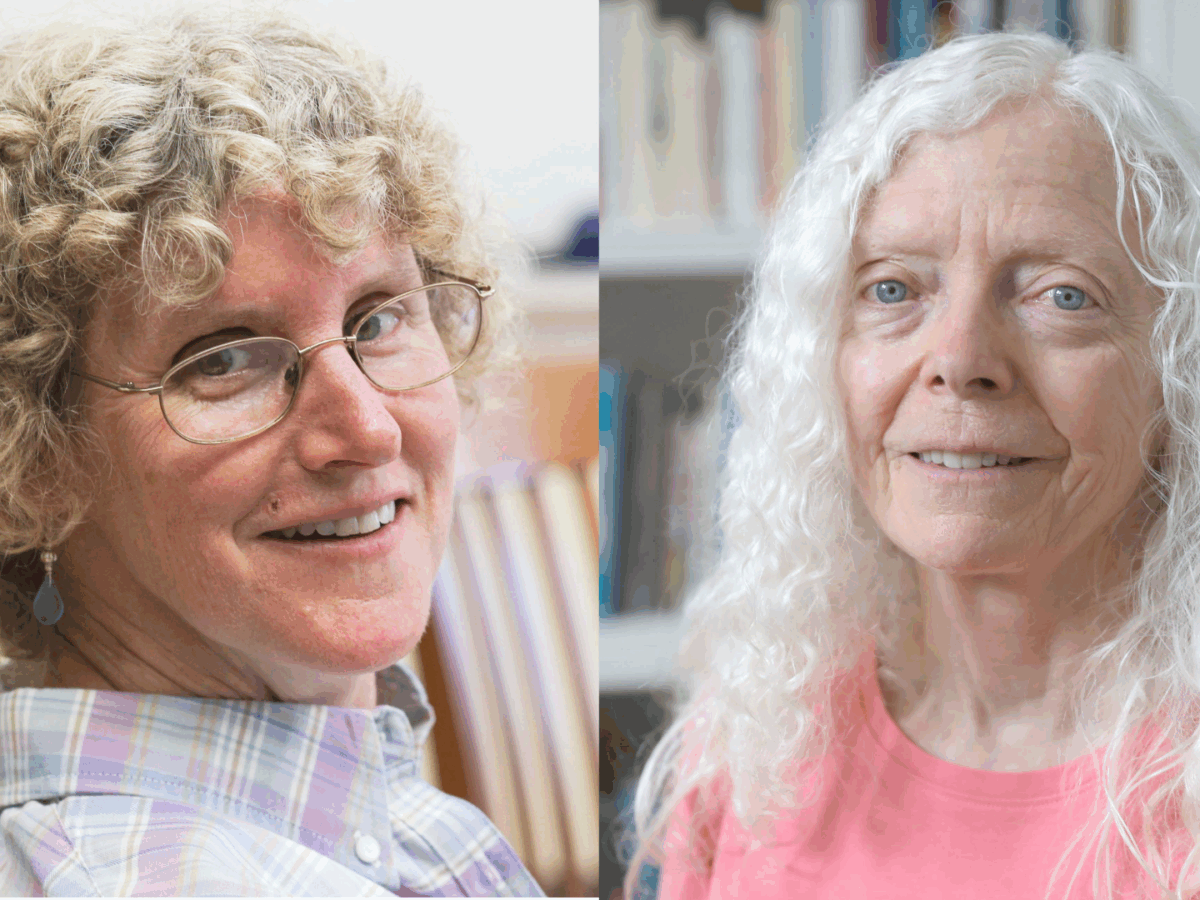
Dale first joined the math faculty at Exeter in 1987 before moving to St. Thomas Aquinas High School. On her return to Exeter in 1998, a colleague wrote that “her true vocation [is] that of a boarding school teacher, interested and ready to be engaged in every facet of a residential school. … Dale is a very special person.” Those of us who have shared this boarding school life with Dale would wholeheartedly agree.
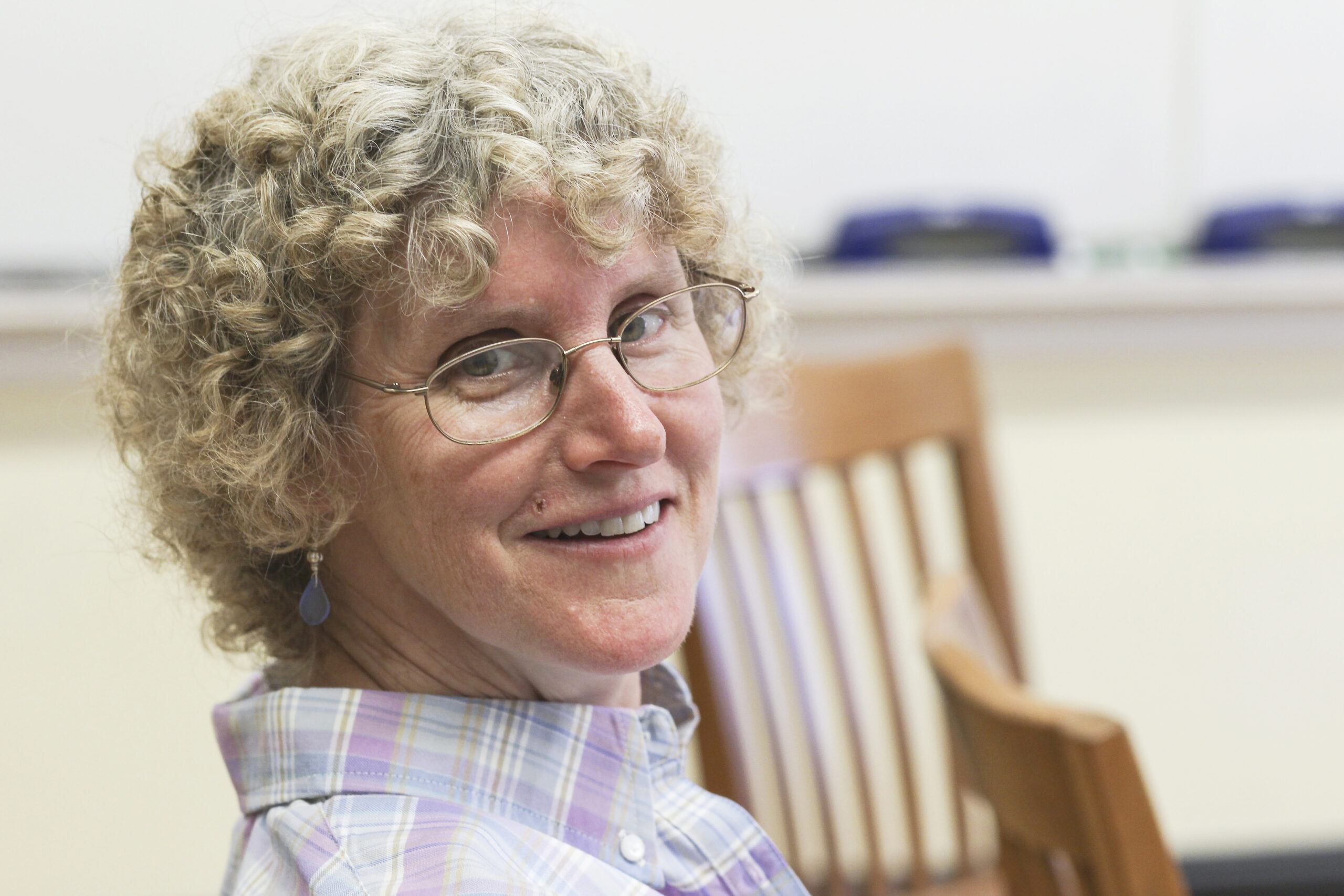
Prior to Exeter, Dale worked as an intern at Choate and St. Paul’s, and taught math at The Stony Brook School and Andover. The math chair at Andover wrote, with perhaps a modicum of resentment: “I would have been pleased to offer her a permanent job if we had one to offer. … She is professional, caring and thorough.” She actually spent a term teaching at both schools. I’m delighted to report that she has said, “Exeter’s pedagogy won, hands down.” Dale received her bachelor’s degree from Williams College and her master’s degree in liberal studies from Dartmouth.
Dale has been involved with the Exeter Math Institute for many years. A colleague who has worked with her at various EMIs told me that all teachers comment on her endless patience and positivity, adding, “She has made a profound impact on school districts around the U.S. through her work with teachers who teach mathematics at all levels.”
Dale has served on the Math Placement Committee and as coordinator for the American Mathematics competitions. She’s been a member of the Orientation Committee, the Advising Committee, the Agenda and Faculty Affairs Committees, the Curriculum Committee, the Community Connections Group, and the Schedule and Calendar Working Group. She has been a mainstay as an admissions reader and assistant girls varsity cross-country coach for over two decades. She has been a supportive mentor to new faculty and also served as a class adviser.
A colleague says, “Students trust and confide in her, knowing she is a caring and supportive adult. She is perceptive and generous with her time and talents.”
Dale’s dorm assignments tell an unusual story. She spent most of her service in Hoyt and Bancroft, and in the latter she served as dorm head. But Dale has also lived in Ewald, Main Street, Peabody, Wheelwright and Williams. This came about because of her willingness to move in for a term to allow colleagues to lead off-campus programs or to cover leaves. Her flexibility contributed greatly to the professional growth and goals of colleagues across campus.
A former chair of the Math Department says: “What has always set Dale apart from other faculty has been her willingness to volunteer and do any job needed to help the school, our department and ultimately the students … While being a ‘triple threat’ was not rare for someone starting their boarding school career in the ’80s, sustaining it for their entire career of 40-plus years is indeed rare. Dale has always understood that classroom teaching, residential life and coaching are the cornerstones of schools like Exeter, and she has done this with success and her ever-present smile.”
Dale received a Brown Award in 2007 and again in 2020, and a Radford Award in 2013.
Thank you, Dale, for the ways in which you brought to our attention the needs of our students, looked out for your colleagues, enhanced our curriculum and proved to be a wonderful colleague.
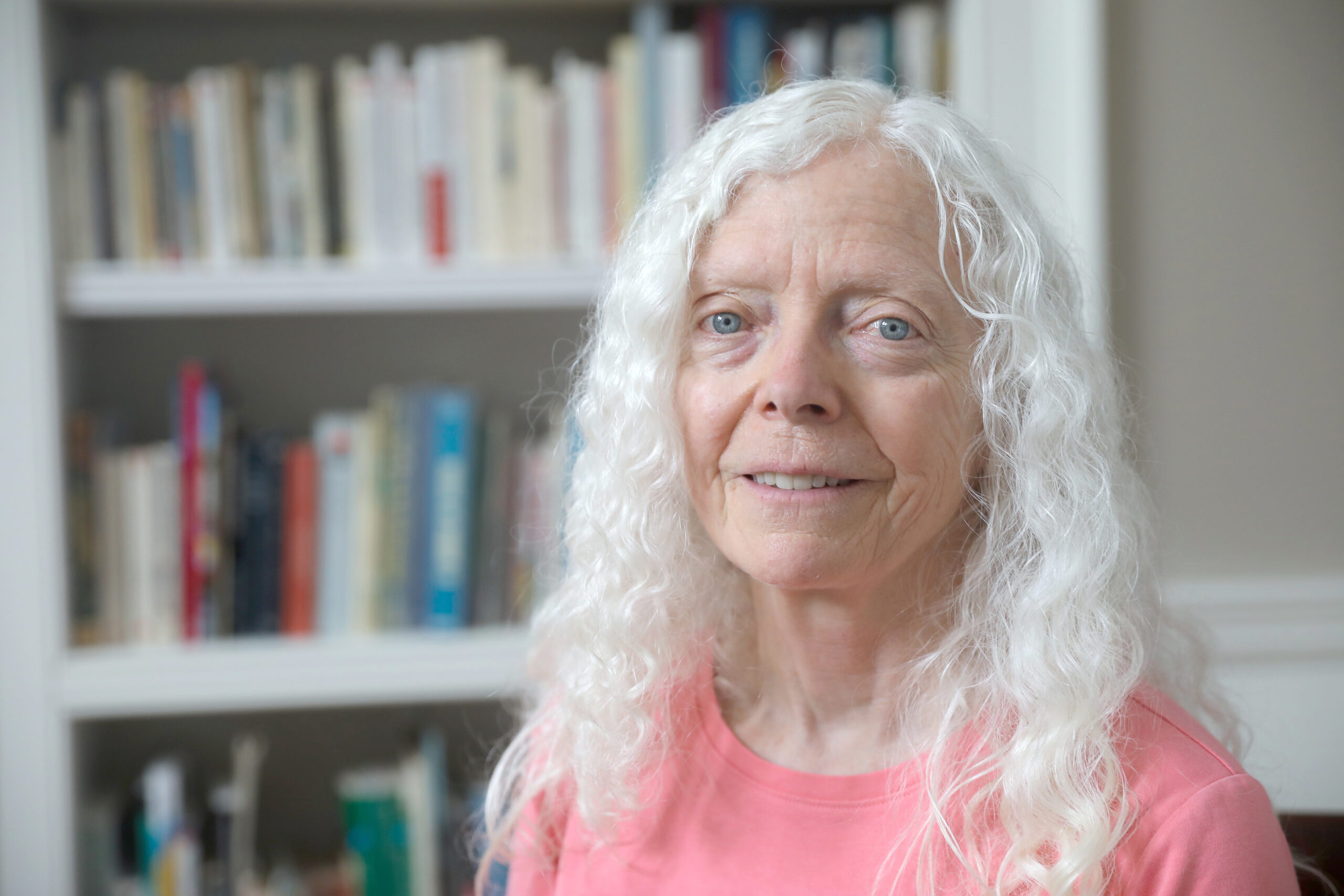
Kitty Fair joined the faculty in 1984 as a French teacher after completing her Ph.D in French at the University of Michigan, making her the longest-serving instructor in our Modern Languages Department. She has instilled a love of French language, culture and landscape in the many students she has taught and the many students she has chaperoned on their term-abroad travels in France. An organized, conscientious, caring, energetic and skilled instructor, Kitty represents the best in our teaching of language and culture.
Kitty’s philosophy of teaching includes an empathetic and supportive attitude toward students for whom the study of a second language is a struggle. Her belief in growth and potential has led her to say, “It’s not necessarily students who show capacity right off the bat who become most fluent in a language.” As a colleague says: “One of her lasting contributions was her firm advocacy for the lower-enrollment languages in our department during her time as department head. She made sure that these programs were protected, valued and given a space to thrive.”
My own impressions of Kitty really formed when I moved into the role of Director of Global Initiatives. Colleagues often asked me what I most enjoyed about moving into an administrative role, and I found myself saying again and again how impacted I had been by the relationships I formed with colleagues from outside my home department. Kitty was the person I always pictured as I said this. We talked at length during those years when she led the term abroad in France, under significant stress at times, at odd hours for one or the other of us due to the time difference, and always with the student experience at the forefront of our thinking. She’s an extraordinary colleague and I feel so fortunate to have forged that relationship with her.
An endurance athlete, Kitty has completed dozens of marathons, an Ironman Triathlon, and served as Exeter’s assistant girls cross-country coach, along with coaching running, cycling, fitness and track. A colleague who coached girls cross-country with Kitty for many years, says: “She was an inspiration, running workouts with the team as she trained for the Boston Marathons that she ran. One year after a long bus ride to Interschols, one of the girls realized that she had forgotten to pack her running shoes. So, she ran the championship race in Kitty’s shoes — literally.”
She completed dorm service in Main Street and Ewald and occasionally stepped back into dorm life to allow her residential colleagues in Modern Languages to lead off campus programs with our students. She has been involved in EJC, ESSO and the Francophonie Society, as well as serving on the Community Conduct and former Discipline committees, and the Admissions, Agenda and Curriculum Committee. She also served more than one term as the department chair in Modern Languages.
Kitty was awarded the Steyer Distinguished Professorship in 2011. She used the support afforded by this professorship to continue her own growth as an instructor, and an impactful trip to Martinique and Guadeloupe led to the creation of a wonderful trip for students to Martinique in 2019. Kitty has continued to read widely and diversify her curriculum, bringing guest writers such as Kim Thuy to meet with her classes over Zoom.
Kitty, you have been such a steady, constant and caring presence in the lives of our students since you joined the Exeter community. Countless colleagues have benefited from your banana bread, your mentorship, your example, your “thoughtful approach to instructional practices” and your kindness. In keeping with your patience with the slow and reluctant French learner, I offer “meilleurs voeux pour votre retraite et merci pour votre gentillesse.”
These citations were delivered by Dean of Faculty Eimer Page at faculty meeting in June.
These citations were originally published in the summer 2025 edition of The Exeter Bulletin.
Twelve students enrolled in ECO520: Microeconomic Theory and Policy formed teams in May to debate the pros and cons of globalization. The next time the class met, the students asked History Instructor Aykut Kilinc which team had won the debate. Instead of answering, Kilinc presented them with two alternatives:
He could announce the winning team, and the members of that team would receive a 10% grade increase on the next test, while the losers would be docked 7%.
Both teams could forgo knowing the results of the debate and agree to have 2% deducted from their next test scores.
“Think like an economist,” Kilinc told the students. “Which option would you choose?”
To decide, the students confronted a version of the prisoner’s dilemma, a metaphor for situations in which individuals (or nations or businesses) acting in their own interest can sometimes lead to worse outcomes for everyone.
In the classic example, two suspects in a crime, held in separate cells, are offered a choice between confessing or staying silent. If both confess, they each will receive a moderate sentence. If both stay silent, they each will receive a lighter sentence. But if only one confesses, the confessor will receive a light sentence — or even go free — and the silent one will receive a harsh sentence.
Each suspect has a strong incentive to confess, given the possibility that the other will do the same. Therein lies the paradox, as both suspects could achieve the best outcome by staying silent.
Students in Kilinc’s class, like all who enroll in the five economics-focused courses Exeter offers, explore how financial markets work, including key concepts like scarcity, supply and demand, and opportunity cost. But as the prisoner’s dilemma illustrates, the core of economics is the study of human behavior: how people and institutions manage and use their money, time, labor and other resources. By studying economics, students gain financial literacy, a better understanding of their spending habits, and training in the analytical and problem-solving skills that will serve them well in nearly every professional field, as well as in daily life.
Perhaps that’s why economics consistently ranks high among the nation’s top college majors, including The Princeton Review’s recent list of the 10 best majors in terms of job prospects and alumni salaries, and USA Today’s ranking of majors that offer the best return on investment.
With the increasing popularity of economics in colleges has come a corresponding rise in demand for economics and personal finance education in high schools. Economics has long been viewed as applicable to many professional fields and pursuits, including finance, public policy, engineering and climate science. Exeter, like many of its peer schools, has met this growing demand by greatly expanding its economics programming over the past several decades. Today, Exonians seeking exposure to economics can find it through a robust slate of popular classes, a highly competitive student-led economics club and two international trips focused on business and entrepreneurship.
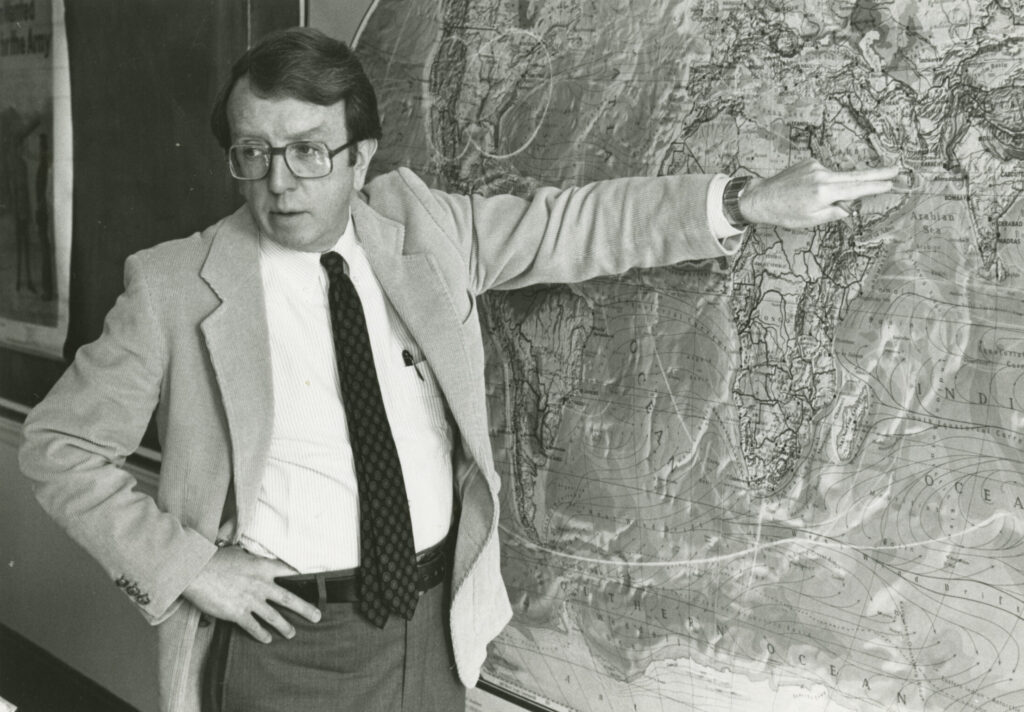
History Instructor E. Arthur Gilcreast helped develop Exeter’s early economics-focused courses.
The origins of Exeter’s current economics offerings date to the late 1970s, when History Instructor E. Arthur Gilcreast took over an existing business course and helped develop an economics-focused history course, HIS45E: Understanding the American Economy. The two courses aimed to help students understand how the U.S. economy works and the origins and workings of the free enterprise system.
According to a 1980 article in The Exonian, the business course had been offered at Exeter since the 1830s. It was taught by one of the Academy’s financial officers, usually the treasurer, before Gilcreast took over. “Many people in this school are going to be businessmen, and it’s important they learn what it’s all about now,” Gilcreast told the student paper.
In 1981, as Exeter celebrated its bicentennial, Gilcreast received the newly created Arthur A. Seeligson, Class of 1913, Professorship in Business, Economics. and History. Two years later, Principal Stephen Kurtz formed a committee (headed by Gilcreast) to undertake a comprehensive review and overhaul of the Academy’s curriculum. The “New Curriculum,” fully implemented for the 1986-87 school year, included a switch to a trimester calendar and a robust new slate of senior-level courses.
Among those were the first two courses offered under the heading of Economics in the Courses of Instruction catalog — Contemporary Economic Issues in the United States and Government and Business in the United States — and a new economics-focused history course, now HIS506: Capitalism and Its Critics. In a similar spirit, the Religion Department introduced what is now REL460: Ethics of the Marketplace that year.
The economics curriculum at Exeter has since been honed and expanded. History Instructor Meg Foley, who assumed the Seeligson Professorship in 2008, helped develop her department’s second economics-focused course, now HIS556: Why Are Poor Nations Poor? Former History Instructor Giorgio Secondi helped refine the existing economics courses and introduced a course in microeconomics.
ECO520: Microeconomic Theory and Policy is now one of Exeter’s three dedicated economics courses, along with ECO510: Macroeconomic Issues in the United States and ECO502: Principles of Economics and Business, an overview course that covers principles of both macroeconomics and microeconomics.
Although they meet no department requirements for graduation, Exeter’s economics courses are among the most popular electives in the course catalog, with enrollment often filling five or more sections per term when they are offered. “I love that because they’re not required, the students are in the course because they really want to learn about these topics,” says Foley, who has taught all five economics-focused courses.
Kilinc, the current Seeligson professor, attributes some of the popularity of the economics courses to the ups and downs of the U.S. economy in recent decades, including the 2008 financial crisis. “I think students want to understand how the marketplace works, how money works and, in so many ways, even how people work,” Kilinc says.
Foley and Kilinc agree that students also see economics as a great way to combine mathematical and analytical skills with an interest in social science, not to mention as a practical choice in terms of college studies and career aspirations. “Even if people specialize in different areas or different fields, they are still required to understand business and economics,” Kilinc says.
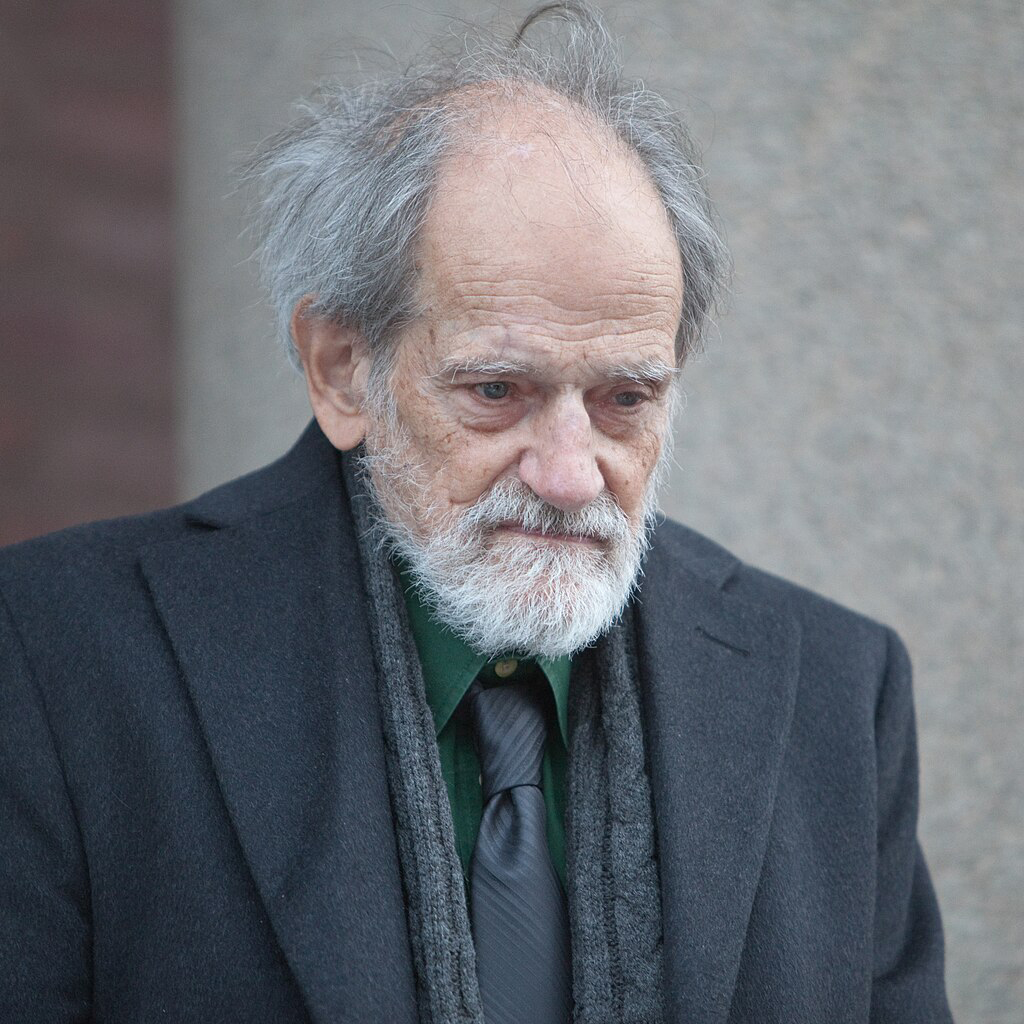 Lloyd Shapley ’40 received the 2012 Nobel Memorial Prize in Economic Sciences for his contributions to the field of mathematical economics and game theory.
Lloyd Shapley ’40 received the 2012 Nobel Memorial Prize in Economic Sciences for his contributions to the field of mathematical economics and game theory.
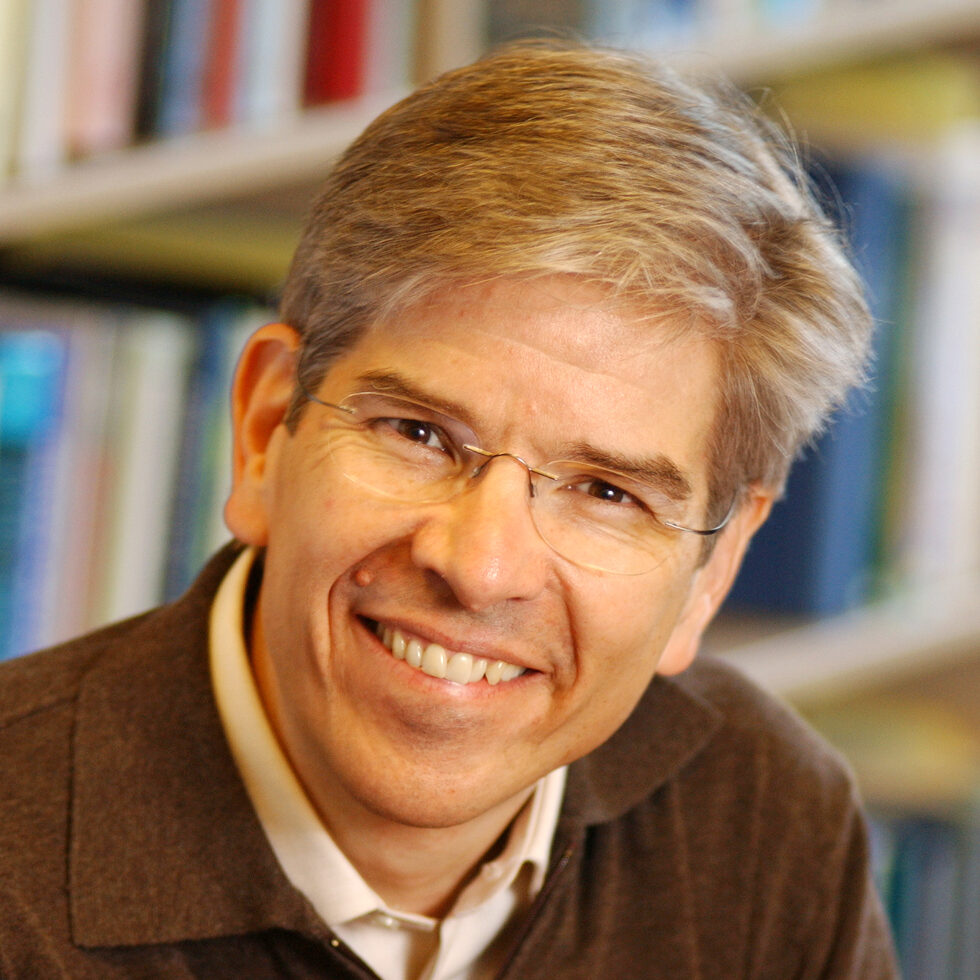
Paul Romer ’73 was a co-recipient of the 2018 Nobel Memorial Prize in Economic Sciences for demonstrating how knowledge and innovation can drive economic growth.
What Evan Soltas ’12 says he remembers very clearly from economics classes at Exeter is “a sense that you were being approached as an equal in the conversation. That you were all there to think through a challenge together, and that these questions were hard, important, interesting and real.”
By the time Soltas came to Exeter as a new lower in 2009, he had developed a keen interest in studying economics. At his former high school, he was involved in the Fed Challenge, a national competition for high school students run by the Federal Reserve Bank of New York.
“It really felt at the time, and still does to me, that economic challenges are really important,” Soltas says. “This is where it feels like research and evidence and discussion are actually valuable — that they’re going to have some contribution to social progress.”
At the Academy, Soltas studied macroeconomics and microeconomics with Secondi, who became an influential figure in his academic life. As a senior, Soltas started the blog “economics & thought,” in which he shared daily commentaries on various topics in economics. After the blog caught the attention of Slate and other national news organizations, as well as prominent economists, Soltas became a regular contributor to Bloomberg News and The Washington Post.
“In retrospect, [the blog] quite quickly took off into something that I was completely unprepared for,” Soltas says. “In many ways, I’ve been riding that wave ever since.”
Soltas majored in economics at Princeton and led the university’s Fed Challenge team. After graduation, he spent two years at Oxford on a Rhodes Scholarship, earning his M.Phil. in economics. In 2024, Soltas completed his Ph.D. at MIT, then spent a year as a postdoctoral fellow at Microsoft Research in New York City before returning to Princeton as an assistant professor of economics and public affairs.
He traces his interest in his primary field of study — urban economics and policy, particularly housing markets — to his years growing up in New York City, as well as his time at Exeter. For his U.S. history term paper (or “333”), Soltas wrote about New York City’s urban decline from the 1950s to the 1970s.
“I’ve always been fascinated by cities,” he says. “There’s great data to study, and the economics are complicated and interesting. Cities make concrete so many theoretical roles for the government, confronting us with its real-world failures and successes and challenging us to learn from them.”
Unlike Soltas, Hoai-Luu Nguyen ’03 came to Exeter with no affinity for economics. That changed when she took Foley’s Capitalism and Its Critics class. Based on that history course and the two economics courses she took at Exeter, Nguyen decided to major in economics at MIT, where she earned her B.S. and Ph.D. in the subject.
Nguyen says she was drawn to economics as “a study of people, and of the institutions that people create,” an idea she absorbed through Harkness discussions. This broad view of the discipline, she says, includes everything from solving huge global challenges to investigating basic questions about human behavior.
“That’s not always a view of economics that comes across very strongly in undergrad econ courses like Micro 101 or something,” Nguyen says. “Those courses necessarily start with fundamentals of economic theory, like supply-demand models and models of trade.”
Formerly a professor at the Haas School of Business at the University of California, Berkeley, Nguyen is the founder of econimate, a YouTube channel aimed at making economics research accessible and engaging. For the channel, Nguyen creates and narrates animated summaries of the papers being written and published by top economists on topics like the consequences of losing a low-wage job or the cost of political corruption, to name two recent examples.
“These papers are not written to be consumed outside of academic circles,” Nguyen says. “Yet precisely because economics asks so many questions that have direct impact on people’s lives, I think what we learn from this research can be of broader interest than just to other professors.”
Nguyen credits Foley’s class and the others she took at Exeter with helping her choose a field of study before she enrolled in college — earlier than many of her peers. Viewed through the broad lens she embraced at Exeter, she sees economics as appealing to a wide range of students with differing career aspirations./
“If you’re interested in the climate crisis, or inequality, or poverty, or how the government works, or how public policy gets made … these are all questions that are studied in fields of economics,” Nguyen says.




In June, a group of Exeter students and faculty headed to Berlin — a vibrant, culturally diverse city that has become a hub for startup businesses in Europe — to study supply and demand, equilibrium, opportunity cost and other key economic concepts.
The Berlin program, started in 2022, is one of two international trips offered through Exeter’s Global Initiatives curriculum that is focused on business and entrepreneurship. Students have also traveled to Singapore.
Beginning this summer, students in Berlin are earning course credit during the three-week intensive version of ECO502: Principles of Economics and Business. The course explores the same principles and macroeconomic and microeconomic questions as the on-campus version but with some focus on the German economy. In addition, students also take German language classes and meet with local entrepreneurs to talk about sustainable business practices.
For Ally Rubin ’26, the trip was an exciting blend of studying business and economics and gaining on-the-ground experience, such as touring the BMW factory and talking with members of the German Parliament to learn more about the country’s economic and political structures. “This trip has furthered my passion for economics and allowed me to gain a new perspective about Germany, and the culture and history that makes it what it is today,” Rubin says.
Beyond the classroom, current Exonians can pursue an interest in economics through the Exeter Economics Association, a thriving student club, as well as Global Initiatives summer trips to Berlin and Singapore, both bustling hubs of business and entrepreneurship.
Dhruv Nagarajan ’25, the most recent co-head of the Exeter Economics Association, was first drawn to economics while watching financial news during the pandemic lockdown. “I’ve always been big into puzzles,” he says, “and I like to view the economy as one big puzzle, where there’s a lot of cause and effect.”
For Nagarajan, the club’s twice-weekly meetings strike a balance. Monday’s curriculum sessions are dedicated to serious study. The Sunday gatherings over dinner in the Seabrooke Room at Elm Street Dining Hall are more casual.
“We have this competitive aspect, and there’s definitely demand for that at a school like Exeter,” he says. “But we also have the more low-key, chill dinner discussions that I and a lot of the competitors also regularly attend, to remind us that it’s not all just about the competitions.”
Students from the EEA regularly enter prestigious competitions like the Northwestern Economics Tournament, the Harvard Pre-Collegiate Economics Challenge and the National Economics Challenge, run by the Council for Economic Education. To prepare for competitions, club members use a 60-plus-page textbook they have created over the past few years. Nagarajan says the text covers both AP material and more advanced theory in macroeconomics and microeconomics.
At the most recent NEC in Atlanta in May, Exeter teams placed second in the Adam Smith Division, for returning, advanced and honors economics students, and the David Ricardo Division, which includes first-time competitors who have taken no more than one economics course.
Nagarajan recalls another proud moment at the Northwestern tournament in 2024, when Exeter’s A team defeated Exeter’s B team in the final quiz bowl round to capture first place. “When I was sitting there, it felt like it was no different from our Monday morning meetings in the Forum at EPAC,” he says. “Only this time it was onstage at the Northwestern competition.”
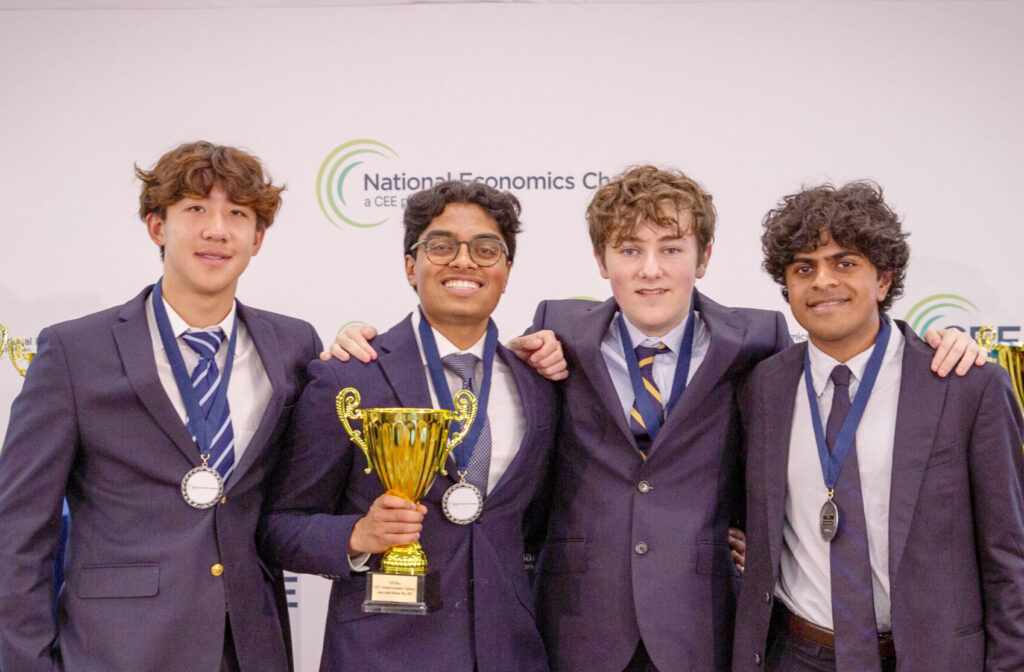
Economics Club members Steven Chen ’25, Dhruv Nagarajan ’25, Eli Orbach ’27 and Drona Gaddam ’27 took first runners-up at the 2025 National Economics Challenge in May.
In addition to his extracurricular economics activities, Nagarajan took Exeter’s macroeconomics course, as well as the two economics-focused history courses. “I really enjoyed the balance of integrating macro with the Harkness method,” Nagarajan says. He gained new perspective discussing the work of influential political economists throughout history — such as Smith, Ricardo, John Maynard Keynes and Karl Marx — around the table with his classmates in Capitalism and Its Critics.
“I knew from studying for these competitions which thinkers had written which texts and postulated which theories,” Nagarajan says. “But I hadn’t yet fully unpacked the actual writing and what they were talking about, to the extent that I did in that course.”
IN KILINC’S CLASSROOM, HIS microeconomics students had to reflect on the problem he had posed before moving on to discussing the rise in counterfeit goods in the global marketplace, the effects of technology on the price of chicken and other topics. Did they demand the results of the globalization debate or choose to forgo a verdict in favor of attaining the best test results for the entire group?
“Let’s take a vote,” Kilinc said. “Do you want to know who the winner is?”
A few hands went up around the room.
“Who would rather take the dominant strategy, or the winning strategy?” Kilinc asked, perhaps tipping the scales a little.
More hands went up, far outnumbering the first group. “Losers,” one outvoted student muttered, drawing laughs from the rest of the room.
“They’re not losers,” Kilinc said.
“They’re real economists.”
Sarah Pruitt ’95 is a staff writer for The Exeter Bulletin.
This article was originally published in the summer 2025 edition of The Exeter Bulletin.
The air was thick with anticipation of the school year’s end and the summer ahead one late-spring day when the temperature climbed above 90 degrees. As students gathered in the Academy Building for the last all-school assembly of the year, historical photos of Assembly Hall flashed on the projection screen. It was a clue that this assembly not only would feature the traditional student speakers and slide show celebrating the graduating class, but also would hold a deeper significance.
The concert choir sang two numbers that morning, including “Rest” by Ralph Vaughan Williams. The choice was appropriate for a space that would be “placed away, but returned to in a few brief months,” said choir director Kris Johnson, the Michael V. Forrestal ’45 Chair for Music.
This was the last assembly in the hall as the Exeter community has known it for more than five decades. A planned two-year renovation of Assembly Hall and the Academy Building began that afternoon.
“This room is about to change, but our purpose in coming to assembly will remain the same,” Principal Bill Rawson ’71 said. “We say goodbye to this room with some sadness because of the experiences we’ve had here and our familiarity with the room. We also are excited to imagine what assemblies will be like when all students and faculty can attend in person in a beautifully expanded and restored space and … with air conditioning.”
For the final time before the new Assembly Hall opens, Rawson dismissed students with a resounding “senior class!”
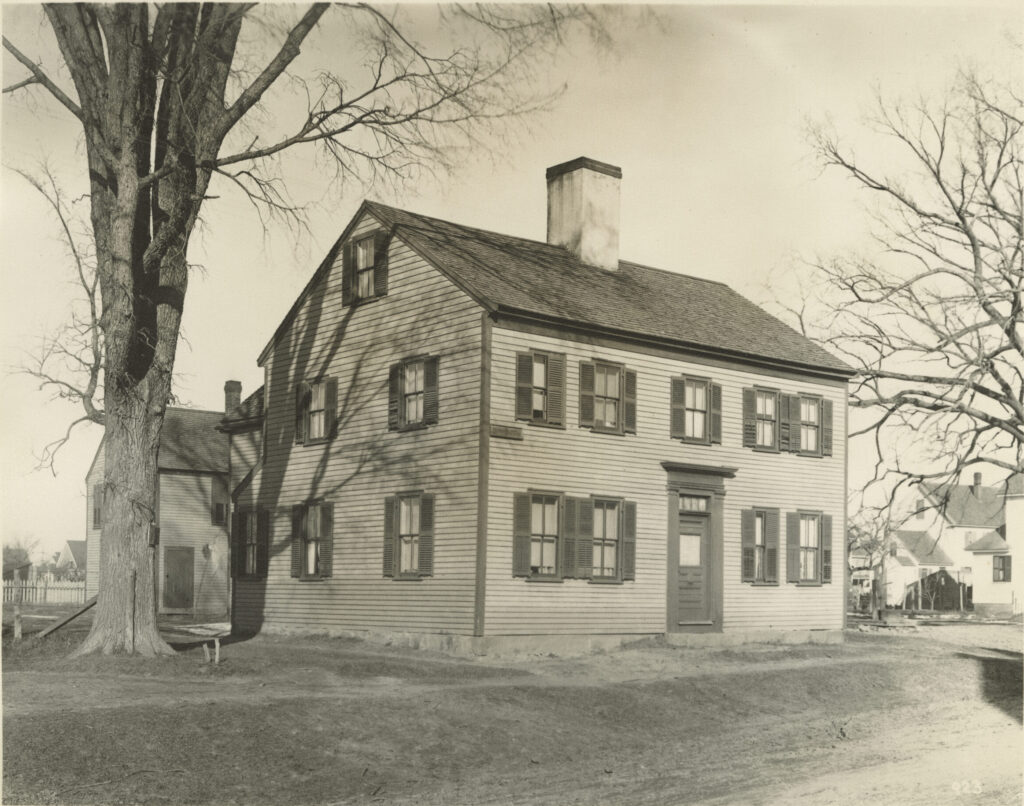
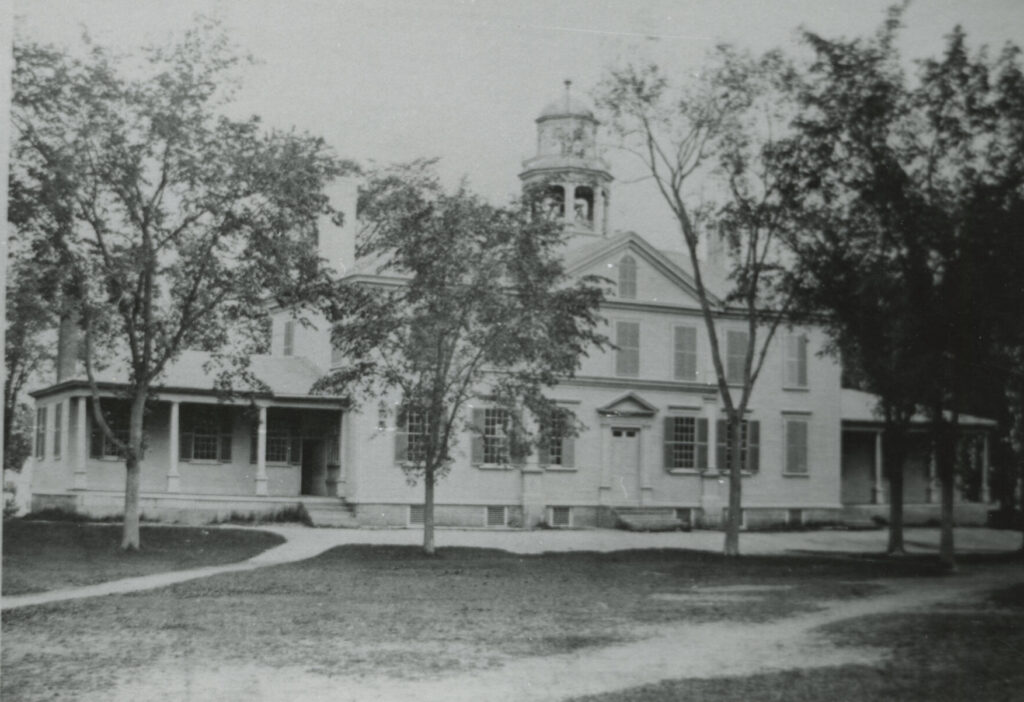
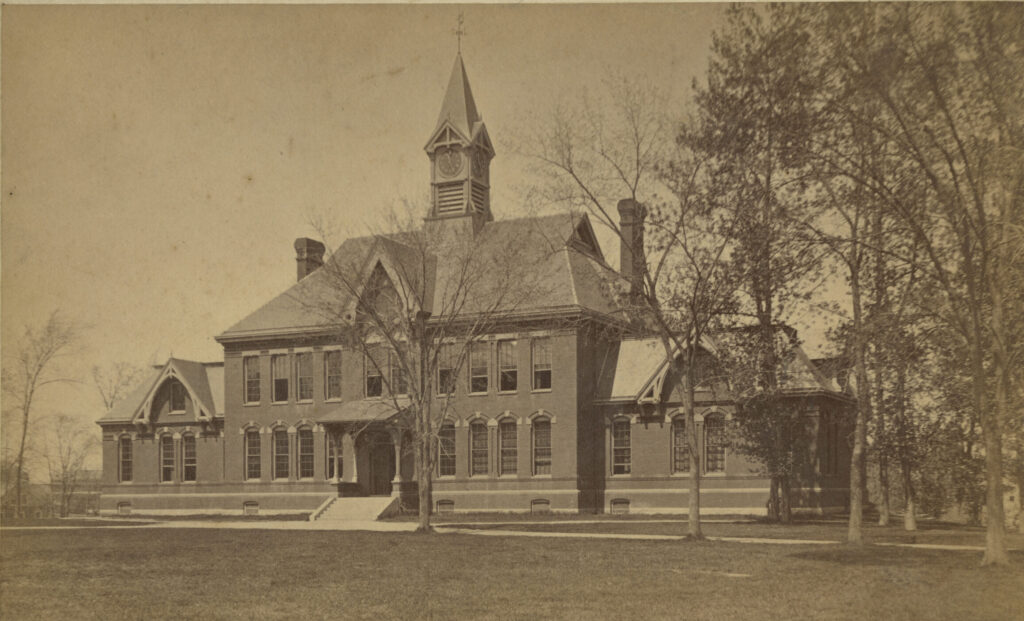
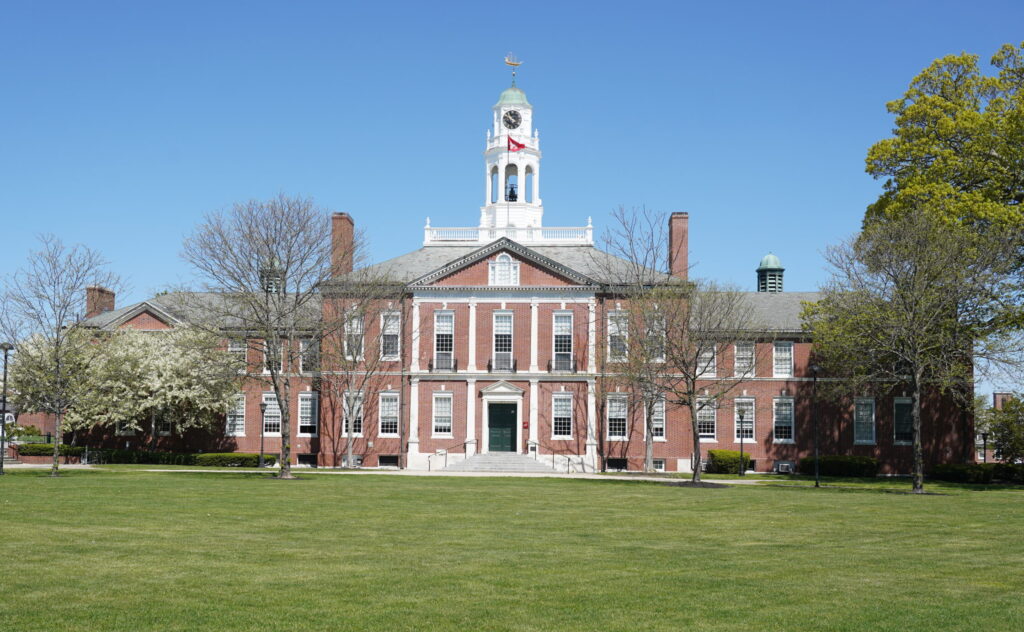
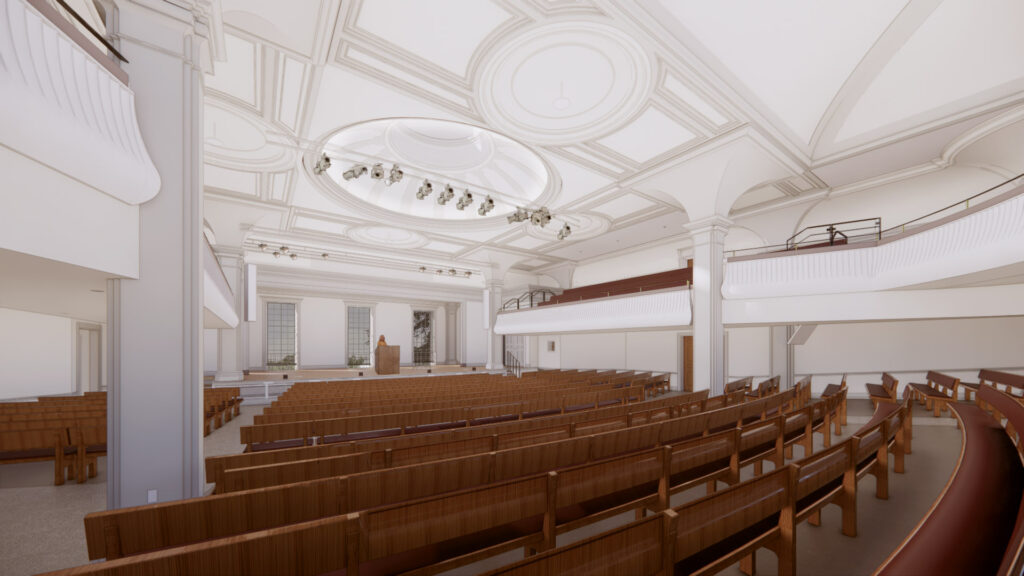
From the time Exeter welcomed its first 56 students in 1783, an Academy Building has served as the center of academic and community life on campus.
Exeter’s first students and faculty share four classrooms in this two-story wooden school house on Tan Lane. It has expanded and moved several times, finally settling on Elliot Street in 1999.
As the school grows, a larger Academy Building is built along Front Street. The Georgian-style building serves the school for nearly 80 years before a fire destroys it.
The third Academy Building is designed to replicate the second as closely as possible, but in brick. Academy chronicler Frank H. Cunningham describes it as “perfect in its proportions and graceful in its outlines.” The building nonetheless meets the same fate as its predecessor.
In the wake of another devastating fire, Exonians raise $200,000 — some $6.2 million today — for the construction of a fourth Academy Building. It incorporates nearly 1 million water-struck bricks and white Vermont marble. An addition to the north side is built in 1931. An update is completed in 1969.
Construction begins on a comprehensive renewal of the Academy Building that preserves its historic character while expanding and reimagining it for Exeter’s future.
Interior demolition of the Academy Building began in earnest in June. The renovation will refresh nearly every space in the school’s flagship building, but perhaps none more consequential than the venerated Assembly Hall.
Situated just below the iconic bell tower, Assembly Hall maintains a timeless aura with its dark wood accents, ornate details and stately chandeliers. Exeter legends who helped shape the school across centuries are immortalized in portraits that overlook the symmetrical rows of deep red seats. This is where John and Elizabeth Phillips Award winners are celebrated, new principals are announced and Exonians come together to share space and consideration as a collective student body.
“It’s nice to be able to see everyone together,” Maya Hinrichsen ’27 says. “That’s why assembly is so important … having that shared experience, then we’re able to take what we’ve heard and talk about it together.”
The regular gathering of the community in Assembly Hall has long been an essential part of the Exeter experience. For generations, Exonians attended what was then called “chapel” every Monday through Saturday at 8 a.m. to hear administrative announcements, sing hymns, listen to lecturers or, when no other speaker was planned, a member of the faculty read from the Bible.
The name was officially changed to “assembly” in 1969, and the frequency of the meeting was reduced to four times weekly. In its current iteration, students and faculty convene twice a week to hear featured speakers, watch performances from student clubs or call for a “sweep” over rival Andover at pep rallies.
“I feel really fortunate to have had the chance to be engaged with such a diverse breadth of speakers during my time at Exeter,” Rachel Baxter ’15 says. “That’s just not something you get once you leave.”
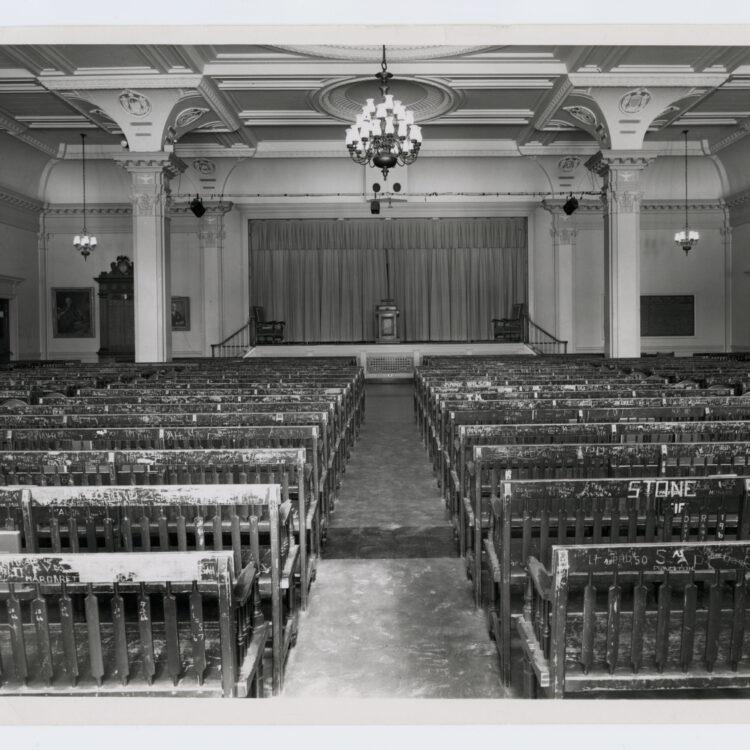
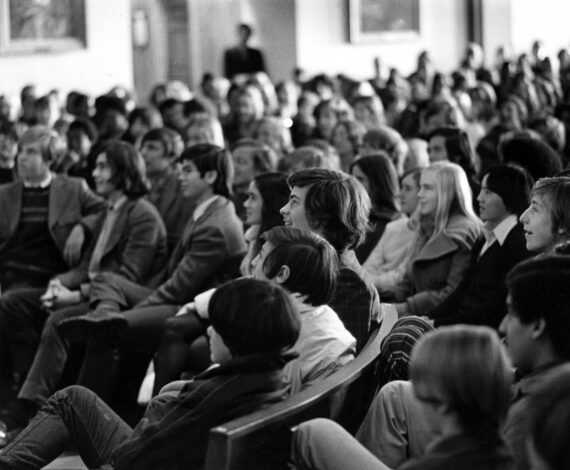
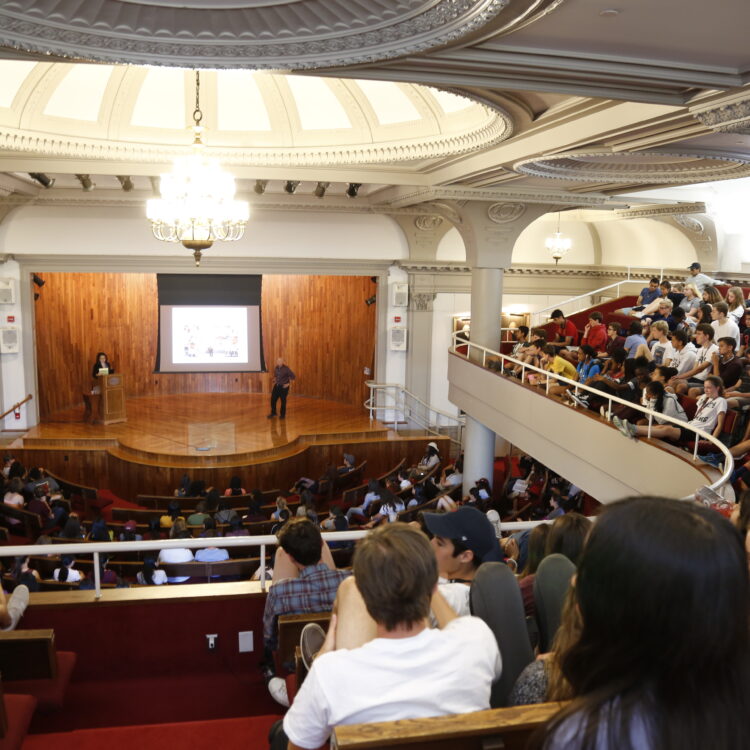
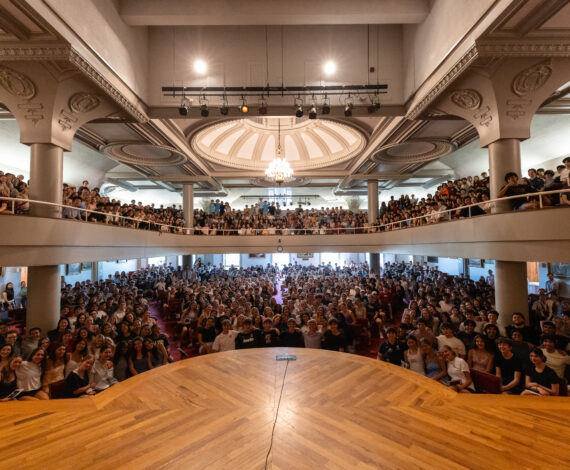
The frequency, the content and the name have changed, but not its objective. “Assembly is where we reflect on our mission and our values — where we celebrate our history, and also imagine our future,” Rawson says.
“Assembly offerings are a major part of our curriculum,” Instructor in Science Tanya Waterman says. “The expanded Assembly Hall will be crucial as we continue building community through shared experiences.”
Constructed as part of the fourth and current Academy Building, which opened in 1914, Assembly Hall was last renovated in 1969. The remodel was part of the “Long Step Forward,” a sweeping capital campaign and building project that included the construction of the Class of 1945 Library, Elm Street Dining Hall, Ewald and Main Street dormitories Fisher Theater, the George H. Love Gymnasium and hockey rinks A and B.
Among the architectural changes to the Assembly Hall were a rounded extension of the stage into the audience, the addition of a balcony and the replacement of straight-line pews with curved benches, increasing the seating capacity to more than 1,000. A feature on the project in the December 1970 issue of Progressive Architecture said, “A cherished room has not only been restored and preserved, it has been made into a new place that has character, definition and purpose.”
Approximate number of required assemblies each year
Seating capacity of the new Assembly Hall
Square feet of the new Design Lab
Number of geothermal wells serving the Academy Building, Phillips Hall and the renovated dining hall
In an all-employee meeting in May, Director of Facilities Management Mark Leighton categorized the Academy Building project, designed by the architecture firm Beyer Blinder Belle, as a renewal. “It’s really a reset,” he said. “It’s going to be almost a brand-new building, except we’ll have a lot of those original and restored features.”
The once-in-a-century investment will update 45 Harkness classrooms; increase Assembly Hall seating capacity to 1,300 to accommodate the entire student body and faculty; offer spacious common areas for discussion, study and collaboration; upgrade audio and visual equipment; and replace the heating and cooling systems, which will connect to the Academy’s network of geothermal wells and align with our Sustainability and Climate Action Plan. The Latin Study, just outside the Assembly Hall, will be preserved and renovated while the Classics Department will move to the newly renovated Davis Library this fall.
Existing elements like the World War I and World War II memorials, as well as the original plaster moldings and marble staircase and entryway will be restored and included in the redesign.
Other school treasures, including the 35 portraits that hung in Assembly Hall, will return to the new Assembly Hall when it reopens or be displayed in places of prominence in other Academy buildings. The portraits honor Exeter’s most respected leaders and benefactors, from founder John Phillips to the first woman to serve as principal, Kendra Stearns O’Donnell. The variety of the styles and subjects reminds us of the school’s long history and recognizes the legacy of the individuals who have shaped the Academy.
“It’s a special room,” Rawson says. “We need an expanded Assembly Hall so that all students and faculty can be in the room together and we can really make the most of our assembly program and the community conversations our assembly should spark.”
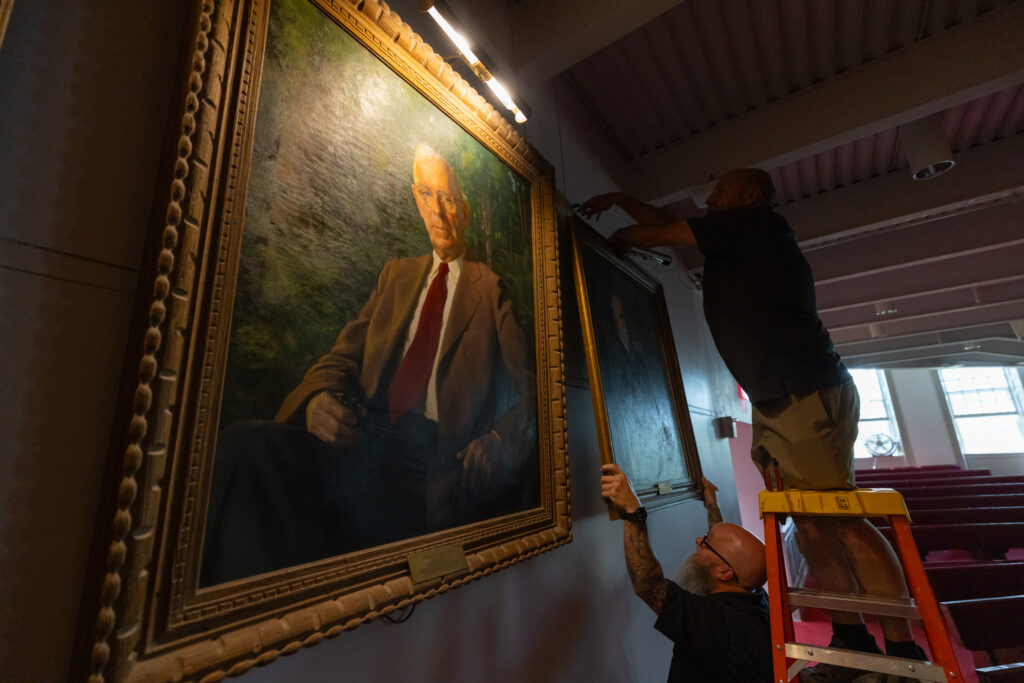
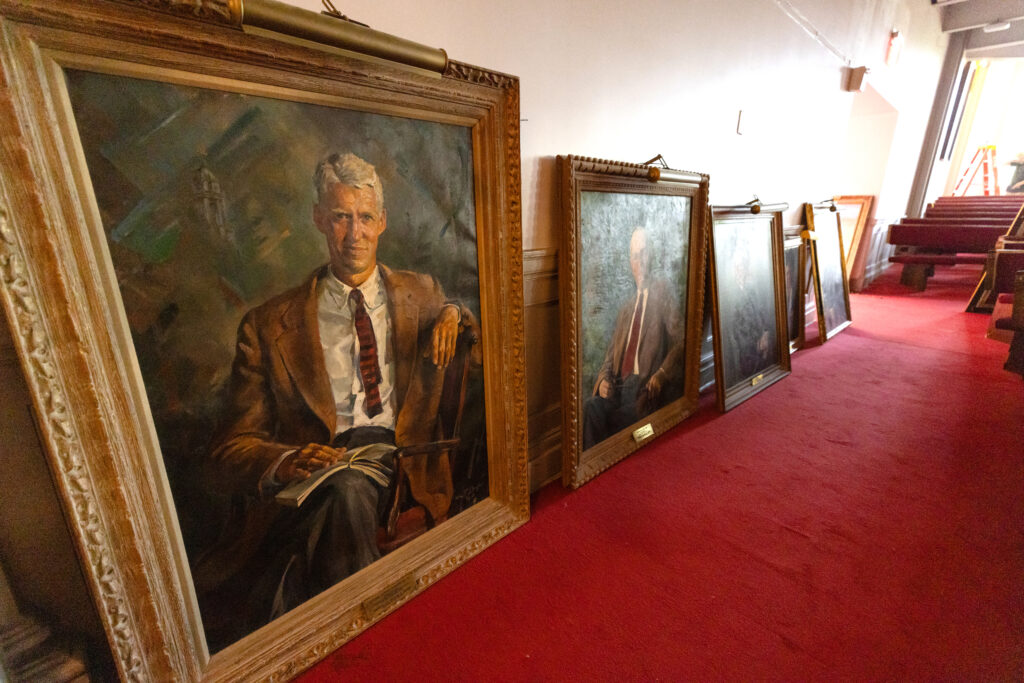
As the project moves forward, 35 portraits that hang in the Assembly Hall were taken down and stored for safe keeping.
Additionally, the orientation of the stage will flip 180 degrees to the south end of the room with windows overlooking the Academy Lawn. “I liken this project to heart surgery,” says Campus Planner and Architect Heather Taylor. “We are taking out the heart, turning it around and putting it all back together.”
Another large-scale project included in the Academy Building renovation is the creation of a 2,600-squarefoot Design Lab that will offer students an expanded and permanent state-of-the- art makerspace with access to 3D printers, laser cutters and a dedicated robotics room. “The new location means a much more visible and accessible space,” Instructor in Computer Science Sean Campbell says. “We will be able to host more and larger groups and accommodate some tools and equipment that just won’t fit safely in our current space.”
Much of the financing for the project came from a fund established by the Class of 1959 to maintain the building and aid in its eventual renewal. “We knew it was an ambitious project,” Tucker Andersen ’59 says, “but we also knew how meaningful it could be.”
Alumni and parents continue to come forward to support the project.
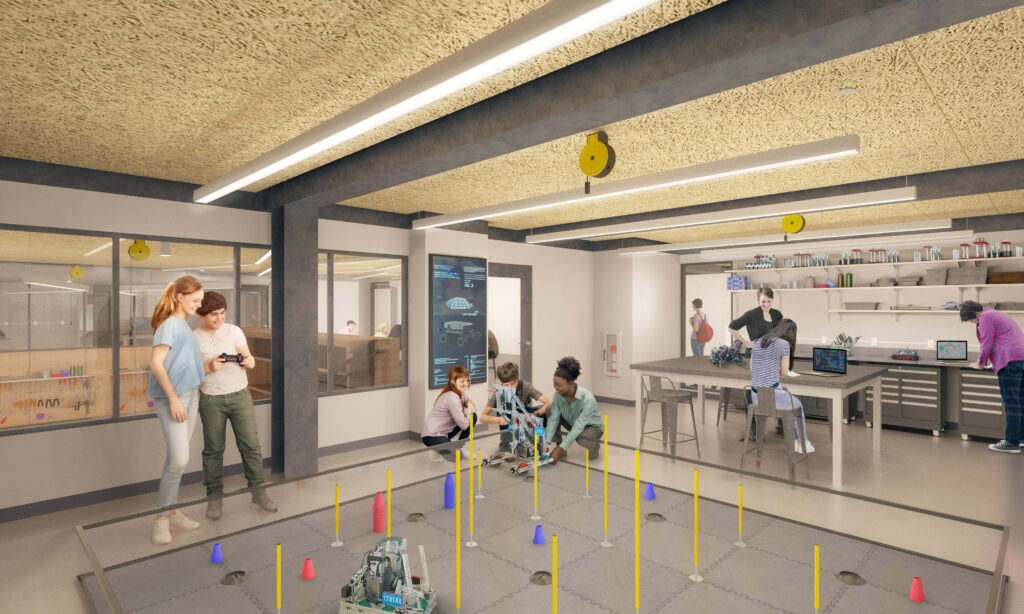
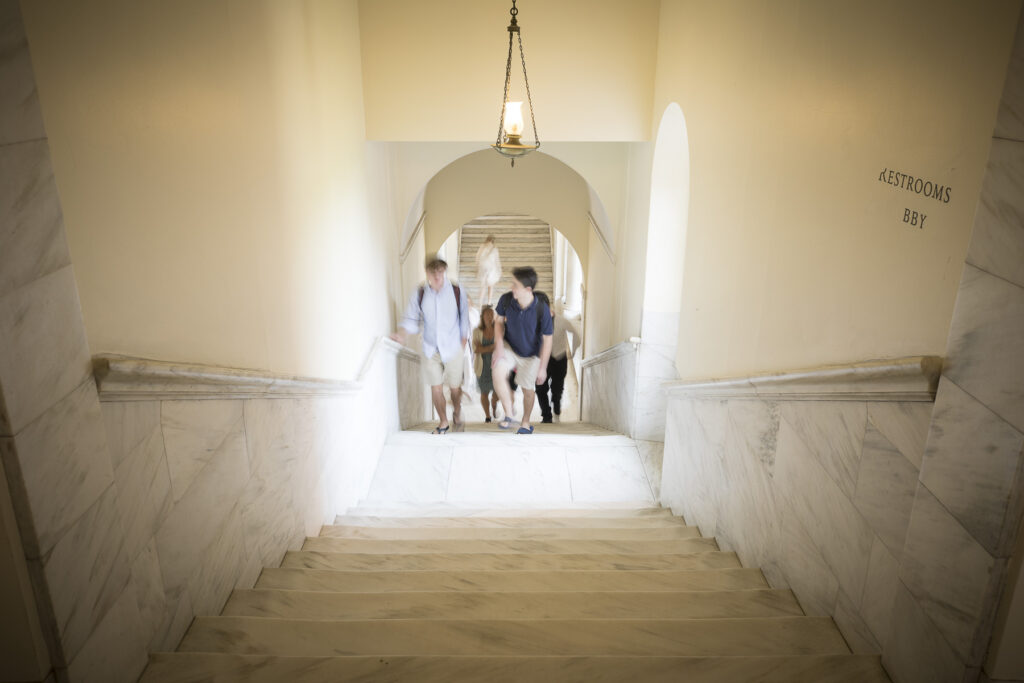
Inside the Academy Building (clockwise from left) The marble staircase will be preserved and restored. A new 2,600-square-foot Design Lab will offer students an expanded and permanent makerspace.
The exterior of the building will also get a makeover, with fixes to the masonry and new roofing, gutters and windows. Assembly Hall is scheduled to reopen in September 2026. In the interim, the assembly program will continue uninterrupted in the Love Gymnasium. The entire Academy Building project is set to be completed by August 2027. Construction throughout the building will be done in phases to minimize the number of unusable classrooms and spaces.
“When we’re done with this building in two years,” Leighton says, “it will be a tremendous improvement for the campus and one that we can check off for 100 years. That is our goal.”
 Behind the Lectern
Behind the LecternFor decades the Academy has hosted a who’s who of speakers on the Assembly Hall stage. Tastemakers from the world of politics, writing and business have recited tales of accomplishments or provided messages of inspiration for the impressionable audience.
“What is consistent with the assemblies I love wasn’t the topic, but the speakers’ energy,” Morgan Momen ’27 says. “Being exposed to great speakers in high school gives us a head start and allows us to take note of what works in other people’s speeches and apply it to our own.”
In the lead-up to his successful presidential campaign, Jimmy Carter spoke to Exonians in February 1976. Eight days later, his successor, Ronald Reagan, did the same. Presidential runners-up Michael Dukakis and Bob Dole each made appearances in the late ’80s. Others from the political sphere like civil rights leaders John Lewis and Julian Bond, Carol Moseley Braun and Ron Paul have all spoken at assembly.
Authors who have spoken at Exeter include James Baldwin, Arthur Miller, Doris Kearns Goodwin, Jorge Luis Borges, Gwendolyn Brooks and poet and four-time Pulitzer Prize winner Robert Frost, who was a regular assembly speaker throughout the first half of the 20th century. Alumni authors Gore Vidal ’43, George Plimpton ’44, John Knowles ’45, John Irving ’61, Dan Brown ’82 and Roxane Gay ’92 have graced the Assembly Hall stage, with Brown delivering an annual address to preps in recent years. Academics Noam Chomsky, Henry Louis Gates and Cornel West and scientists J. Robert Oppenheimer, Jane Goodall and Sylvia Earle are all part of the storied list of assembly speakers.
“If you were to think about the people who have spoken onstage, and the impact they have had on student lives, it’s really powerful,” Principal Bill Rawson ’71 says.
Which assembly speaker do you remember? Share your memory with us at bulletin@exeter.edu.
Adam Loyd is a digital content producer for the Office of Communications.
This article was originally published in the summer 2025 edition of The Exeter Bulletin.
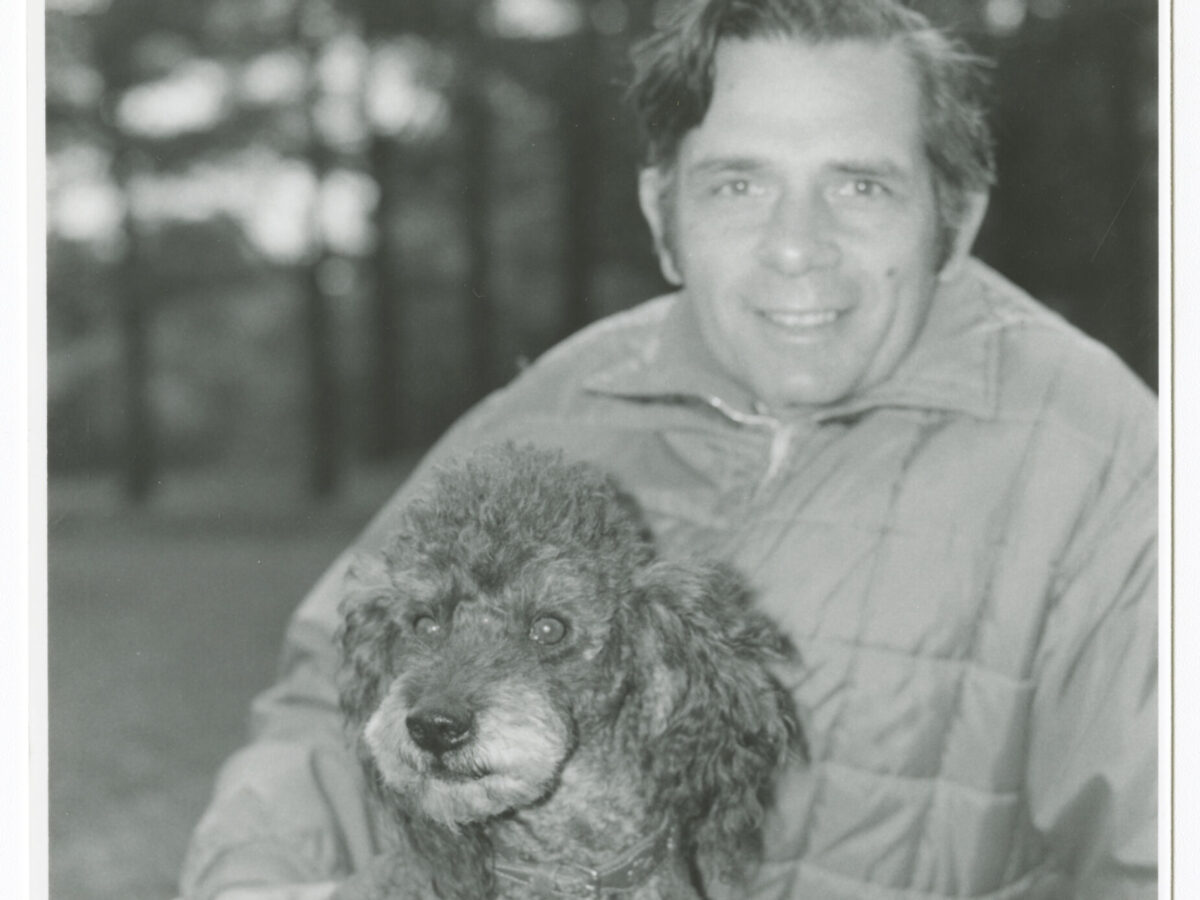
Upon the occasion of C. Robert Clements’ appointment as the George Albert Wentworth Professor of Mathematics in 1985, Principal Stephen Kurtz wrote, “You are living proof that ‘the school man,’ like the blue-footed booby you look for worldwide, is a species endangered but not extinct.” And while it is true that much of Bob’s career was spent teaching and caring for students at boys’ boarding schools, he proved himself to be the consummate school person during his tenure at Exeter following co-education after 1970.
In fact, during his tenure as chair of the department, Bob himself was most proud of hiring and retaining women: “We have been able to attract and hold good mathematics teachers…because of the quality of our program, because of the competence of our tenured members, and mostly, because of the generous collegiality embraced by all…During the past ten years [1978-88] half of the new members of the department have been women…Right now we are in a very strong position with a number of excellent women in the department. I hope we can maintain this trend.”
Born July 5, 1925, in New York City, Bob and his brother James essentially grew up in a group home in Hudson, NY because their parents needed help with their care. They lived there until high school graduation, while always remaining in touch with their parents. Despite this beginning, Bob graduated a year early as high school class valedictorian in 1943.
During World War II, Bob served as a navigator in the U.S. Air Force. After the war, he returned home and enrolled at Hamilton College, graduating with a B.A. in 1949 and taking a teaching position at Choate (now Choate Rosemary Hall). During the Korean War (1951-52), Bob returned to duty in the Air Force. Rejoining the faculty at Choate, Bob taught there for two decades, becoming Math Department Chair, before accepting an appointment at Exeter in 1969. Colleague Eric Bergofsky believes Bob’s military experience served him well, particularly in moments of crisis. Clem had a talent for keeping challenging moments in proper perspective. When, for example, a colleague or student was feeling unduly stressed, Bob remained calm. He had, after all, lived through Korean bombing missions. He had a knack for lowering the temperature of the moment and would often say, “Getting shot at over Korea while flying at 30,000 feet is a crisis, this is a problem we can solve.”
A veteran teacher, coach, and dormitory advisor, Bob immediately made a name for himself at Exeter as a versatile and brilliant mathematician, a colorful character with a sharp wit and unwavering devotion to the responsibilities of boarding school life.
When asked to contribute to this remembrance for Bob, the response from alumni was overwhelmingly positive and enthusiastic, many more than can be related here. The common denominators were clear: a favorite teacher, he was caring, down-to-earth, rigorous, funny, mischievous, kind, and generous. Michele Kreisler ’85 wrote, “Mr. Clements was the most outstanding mathematics teacher I have ever had… [He} held a lively class that was never boring, and many times felt like family…[he] made learning an abstract subject fun and easy.”
Bob had a talent for demonstrating the practical applications of math. Students recalled, for example, Bob’s gambling escapades: “I loved Mr. Clements’ math class and remember his love of gambling…he liked to play blackjack and… [he told us] he would pay someone to drag him away from a table after his winnings had reached a certain level,” (Philip Von Burg). Joseph Crowley ’77 remembered that “he showed us how to do a card trick that relied on doing a perfect shuffle (exactly one card at a time from each side of the shuffle). We solved math and geometry problems involving playing cards. Nevertheless, we mostly ended up on the right track in life.”
Many students credit Bob with influencing their choices of college major and career. Elizabeth Scout Joy ’90 wrote that “Mr. Clements’ sarcastic, dry humor, chalky tweed jackets, and robust ‘stache could be intimidating to some, but I thought he was funny…[he] helped me gain a confidence that put me on the path to be a math major in college and then enjoy a career in Finance.”
John A Koski summed it up well by writing, “Mr. Clements was truly a remarkable instructor and made such a significant impact on my time at Exeter and my education. He demanded excellence and rigor in the classroom, but all wrapped in a fun and engaging demeanor. His subject was mathematics of course, but the learnings from Mr. Clements’ classroom were broader and encompassed core skills of critical thinking and broad problem solving. He certainly represented the paradigm of the Exeter teacher…a union of goodness and knowledge.”
Bob Clements’ influence, however, went far beyond the classroom. Bob Morse ’89 wrote, “As a new day student…I was the only one in my French 11 class not to have taken a class in French before high school. I was completely lost. And so “clutching a generously graded ‘D-‘ test in hand, I sought out Mr. Clements in the Math Dept [room]…My thoughts ran along the lines of: What the heck is the chair of the math department supposed to do for a 14 year old failing French?…He told me how much he’d suffered in learning a foreign language in college, and how the thing that worked was to write out each new word five times and then just toss it in the trash. I don’t know why, but I felt like he’d given me the answer… I sat there copying words while he graded homework… We met several more times that fall. With his approach I passed French 11. Indeed, Lower year, I won second in French on Prize Day.”
Another story of Bob’s kindness and caring from Andrea Thomas who remembers being a late admit arriving after orientation and the start of classes, feeling “shellshocked and intimidated,” and having to take the math placement test. Clem gave her the test and left Andrea alone in an empty classroom. Unfortunately, she “could not figure out how to attack a SINGLE problem! Tears started flowing.” Returning to the department room, she silently handed the empty blue book back. “He opened it and looked at me and I burst into tears…He told me not to worry, that they would be able to place me in the right class without the test, that he was sure I was tired from the effort of getting to school…On a very challenging day, he put a young student at ease…I am forever grateful.”
Charles Neuhaus ’79 adds his memory of ending up in the infirmary with a broken arm and tooth, chagrined that he would be there for at least a week. He wrote, “Much to my surprise, a couple of days into my stay, Mr. Clements brought our entire math class to the infirmary, so I wouldn’t be left out… and fall behind in my studies. This gesture meant more to me than you can imagine… Mr. Clements was more than a math teacher; he was a good friend…”
In 1981 in honor of his work in the dormitory, parents of a former Exonian who lived in the dorm with Bob and his wife Louise, established the C. Robert Clements Scholarship, a financial aid fund for handicapped students. Both Clementses held this award in the highest esteem of Bob’s “awarded honors” and corresponded regularly with the recipients. As a further tribute to their work, in 1976 Robert and Louise were voted Honorary Members of the Class of 1931. Richard B. Treadwell ’84 said it best: “The main reason Mr. Clements has such success is because he likes dorm life…The pleasure he gets from dealing with students and running a dorm is apparent in how smoothly the dorm operates and how content the students are.” Probably the steak and ice cream socials, affectionately called “The Nerd Party” dinners that he and Louise provided for dorm students who had no unexcused absences for a whole semester, helped as well!
Bob Clements certainly met the challenge of Exeter’s triple threat: classroom, dormitory and athletics. He coached football, golf, track, and squash at Exeter. One year he was even “permitted to coach club baseball” [S. Kurtz]. Derek Stal ’89 remembered that as a tennis player making the transition to squash, his “interactions with Mr. Clements were among my most memorable at PEA. I can still hear him from the gallery above the courts, issuing somewhat nebulous coaching advice with daily frequency and great conviction, ‘C’mon, Stal, HIT the ball!’ He encouraged me to embrace the physical side of the game and not worry about the skills that I was obviously lacking.” Derek went on to describe how he chased “balls relentlessly until [his] more talented opponents either prevailed or ran out of patience and energy…Mr. Clements informally awarded us…with titles, mine being the ‘Biting Dog Award.’ As he explained, ‘Stal, you’re that annoying little dog that bites onto your ankle and never lets go.’ This is one of the awards of which I’m most proud. Try hard, never give up, and do what works for you.”
Despite his busy life in school, Bob filled much of the remaining time furthering his own education, and continually learning new mathematics, including pioneering computer use, and becoming the school’s first Computer Coordinator. Jack Heath, Dean of the Faculty wrote in 1985, “He is largely responsible for the breadth and depth of our mathematics curriculum. You name it, he teaches it…Of all our academic departments his is the most cohesive and professionally active…The teachers congregate in [the department] room during free periods and talk shop…Math teachers here develop by teaching, but also by hobnobbing with other math teachers.” Bob loved his department and colleagues and took immense pride in his role as a leader. The Math Department debated everything from the most elegant solutions to problems, to sports, politics, and especially school and departmental policies. No matter how heated or contentious arguments became, a democratic department vote always settled the issue and then Bob was off to play squash with the same colleagues he had just argued with.
Bob’s own education and training included the Harvard Academic Year Institute, followed by an Ed.M. from Harvard (1959), a Certificate of Advanced Study in computers from Wesleyan University (1964), a Klingenstein grant, and several NSF grants for further study. And he was continually and generously offering courses outside of Exeter in Advanced Placement Calculus and Probability. The head of the math department at Winnacunnet High School praised him for “the high quality of the presentation…[being] knowledgeable in the subject matter…and obviously well prepared…After a full day of teaching, we especially enjoyed our teacher’s excellent sense of humor.”
Colleagues at Exeter were similarly effusive and enthusiastic in their remarks. As a new hire in 1985, Joyce Kemp remembered her family being genuinely concerned whether their dog would be allowed in the dorm. In a phone conversation, Bob described how there had been major problems with dogs fighting and making trouble, and that a new rule was recently established that didn’t allow dogs (long, pregnant pause) in classrooms. He could probably hear sighs of relief all the way from Massachusetts. Stephanie Kay (now Girard) clearly recalled her first year at PEA, which was also the first year of the “new curriculum.” Bob was department chair, and when he handed Stephanie a copy of the weekly schedule and told her what formats and courses she was teaching, he said “If you can figure out where you are supposed to be when, you can have my job.”
Bob was a terrific self-taught golfer, who was head varsity golf coach for many years. In the ‘70’s, he helped create the end-of-year Faculty Golf Tournament, a tradition that lasted for many years past his retirement. It was open to all faculty and staff, and he particularly designed it so that everyone felt invited, whether a raw beginner or an accomplished golfer. There was always a nice party afterwards that included many humorous and fun awards. Bob himself won the championship many times and his close friend and math colleague Spruill Kilgore won the women’s title.
Tony Greene only taught with Bob for one year; however, he wrote, “Norma [Tony’s wife] and I saw a lot of him after his retirement because of our mutual involvement in duplicate bridge. When he retired, I remember him saying that he wanted time to pursue three passionate interests: birding, golf, and bridge. For at least 25 years after his retirement, Bob was a regular participant in national, regional, and sectional duplicate bridge tournaments. During this time, he reached the level of Gold Life Master, and he once won the New Hampshire state pairs championship…I took Bob’s probability course at the Exeter Math Conference. This was a field of mathematics he put to significant use both at the bridge table, and on his occasional visits to casinos. In 1991, while playing in Las Vegas at a national event, he once, in one day, played 4 sessions of bridge…finishing around 1 AM and then visited the casino for a few hours to unwind… Bob Clements was one of a kind.” And as Principal Steve Kurtz said, he was even “rumored among the students to be unwelcome in Las Vegas and Monte Carlo because of [his] penchant for breaking the bank.”
Bob’s passion for birding and traveling was also very well known. His daughter Joan said that he shared these “life-long loves” with his brother James “who was a world-renowned ornithologist, author of six editions of the book, “Birds of the World, A Check List.” Several of Bob’s photographs, faded by now, are still hanging in the department room. Dick Brown reported, “On one birding trip with Jim, the two crashed their small plane in the treetops of the jungle. Miraculously they were not hurt. Bob also loved to ski. Four faculty members (Bob, John Warren, Phillippe Turnysen and I) arranged our winter schedules so we did not have late morning class, allowing us to drive 1.25 hours to Gunstock for two hours of skiing.” The list of countries that Bob, and often Jim, traveled to included France, Germany, Peru, Botswana, Zambia, Argentina, Chile, New Zealand, Nepal, India, Sri Lanka, Paraguay, Bolivia, Venezuela, and Thailand.
Though Clem retired in 1990, he leapt at the chance to return to Exeter more than a decade later as a member of the Summer School faculty. Doug Rogers, who served as Summer School Director at that time, invited Bob to join emeriti instructors, Nita Pettigrew and Harv Knowles, as mentors to teachers new to Harkness pedagogy. Together, this dream team of Clements, Knowles, and Pettigrew represented over 162 years of teaching experience, the bulk of it, in Harkness classrooms. Clem was thrilled to return to New Hampshire, thrilled to be the eldest member of the Summer faculty. As he had for his entire career, Bob embraced his mentoring responsibilities with care, dedication, and a wonderfully wry sense of humor. Eric Bergofsky, director of the Exeter Mathematics Institute (EMI) at the time, recalls Bob enthusiastically being a member of a team of Exeter math teachers working with the Phoenix Public School teachers in the late 1990’s. Bob, now in his 70’s, taught his favorite probability course and was a big hit with the new generation of teachers half his age.
Visiting Bob In the community where he and Louise were living at the time, Joyce Kemp was not surprised to see Bob’s photographs of birds and travel locations adorning the hallways, and Bob himself preparing to give a talk that week to the residents. Always teaching, always entertaining, always learning.
He is survived by his daughter Joan Clements Francis, her ex-husband Greg Gilchrist, their children Sarah and Nate Gilchrist, Eleanor and John’s sons James and Sam Bellinger, great grandchildren Sophia, Louise, Evelyn, and Cameron Bellinger. The family on Bob’s brother Jim’s side remained close and active in his life until Bob’s death, including Jim’s widow Karen Clements, a nephew and his wife, Dan and Karen Clements, a grandnephew and his wife, James and Alex Clements, and one great-grandnephew, Griffen.
I move that this Memorial Minute be submitted to Bob’s daughter, Joan Clements Francis, and be spread upon the minutes of the faculty.
Respectfully submitted,
January 15, 2025
Joyce C. Kemp
Eric S. Bergofsky
Richard G. Brown
Stephanie Girard
Anthony W. Greene
Douglas G. Rogers
This Memorial Minute was first published in the summer 2025 issue of The Exeter Bulletin.